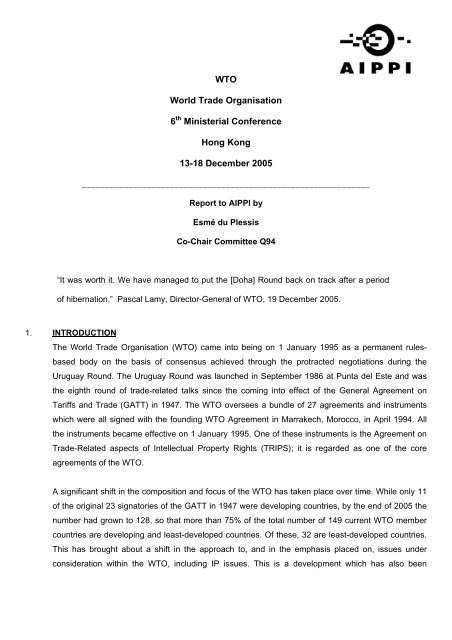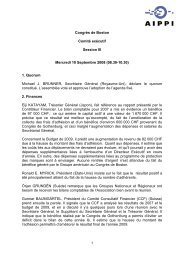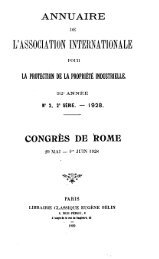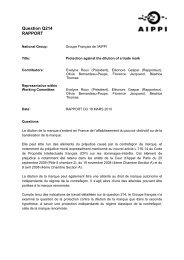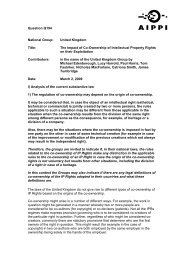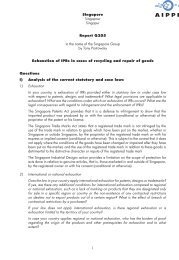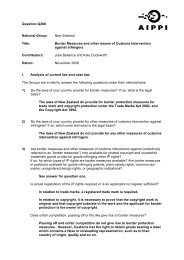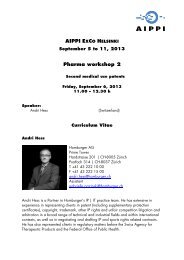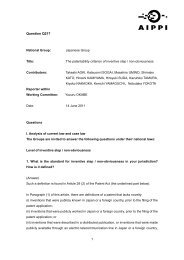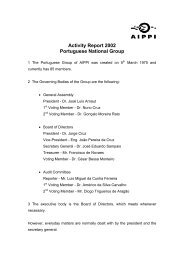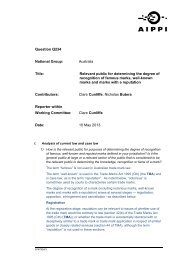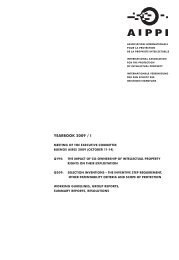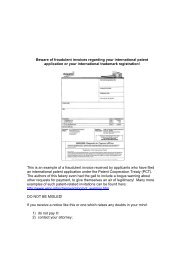Report on the 6th Ministerial Conference of WTO - AIPPI
Report on the 6th Ministerial Conference of WTO - AIPPI
Report on the 6th Ministerial Conference of WTO - AIPPI
Create successful ePaper yourself
Turn your PDF publications into a flip-book with our unique Google optimized e-Paper software.
<strong>WTO</strong><br />
World Trade Organisati<strong>on</strong><br />
6 th <strong>Ministerial</strong> C<strong>on</strong>ference<br />
H<strong>on</strong>g K<strong>on</strong>g<br />
13-18 December 2005<br />
______________________________________________________________<br />
<str<strong>on</strong>g>Report</str<strong>on</strong>g> to <strong>AIPPI</strong> by<br />
Esmé du Plessis<br />
Co-Chair Committee Q94<br />
“It was worth it. We have managed to put <strong>the</strong> [Doha] Round back <strong>on</strong> track after a period<br />
<strong>of</strong> hibernati<strong>on</strong>.” Pascal Lamy, Director-General <strong>of</strong> <strong>WTO</strong>, 19 December 2005.<br />
1. INTRODUCTION<br />
The World Trade Organisati<strong>on</strong> (<strong>WTO</strong>) came into being <strong>on</strong> 1 January 1995 as a permanent rulesbased<br />
body <strong>on</strong> <strong>the</strong> basis <strong>of</strong> c<strong>on</strong>sensus achieved through <strong>the</strong> protracted negotiati<strong>on</strong>s during <strong>the</strong><br />
Uruguay Round. The Uruguay Round was launched in September 1986 at Punta del Este and was<br />
<strong>the</strong> eighth round <strong>of</strong> trade-related talks since <strong>the</strong> coming into effect <strong>of</strong> <strong>the</strong> General Agreement <strong>on</strong><br />
Tariffs and Trade (GATT) in 1947. The <strong>WTO</strong> oversees a bundle <strong>of</strong> 27 agreements and instruments<br />
which were all signed with <strong>the</strong> founding <strong>WTO</strong> Agreement in Marrakech, Morocco, in April 1994. All<br />
<strong>the</strong> instruments became effective <strong>on</strong> 1 January 1995. One <strong>of</strong> <strong>the</strong>se instruments is <strong>the</strong> Agreement <strong>on</strong><br />
Trade-Related aspects <strong>of</strong> Intellectual Property Rights (TRIPS); it is regarded as <strong>on</strong>e <strong>of</strong> <strong>the</strong> core<br />
agreements <strong>of</strong> <strong>the</strong> <strong>WTO</strong>.<br />
A significant shift in <strong>the</strong> compositi<strong>on</strong> and focus <strong>of</strong> <strong>the</strong> <strong>WTO</strong> has taken place over time. While <strong>on</strong>ly 11<br />
<strong>of</strong> <strong>the</strong> original 23 signatories <strong>of</strong> <strong>the</strong> GATT in 1947 were developing countries, by <strong>the</strong> end <strong>of</strong> 2005 <strong>the</strong><br />
number had grown to 128, so that more than 75% <strong>of</strong> <strong>the</strong> total number <strong>of</strong> 149 current <strong>WTO</strong> member<br />
countries are developing and least-developed countries. Of <strong>the</strong>se, 32 are least-developed countries.<br />
This has brought about a shift in <strong>the</strong> approach to, and in <strong>the</strong> emphasis placed <strong>on</strong>, issues under<br />
c<strong>on</strong>siderati<strong>on</strong> within <strong>the</strong> <strong>WTO</strong>, including IP issues. This is a development which has also been
eflected in o<strong>the</strong>r internati<strong>on</strong>al and UN bodies, such as WIPO, and which <strong>AIPPI</strong> should take into<br />
account in its strategic planning.<br />
From its very beginning <strong>the</strong> main objective <strong>of</strong> <strong>the</strong> <strong>WTO</strong> has been <strong>the</strong> liberalisati<strong>on</strong> <strong>of</strong> internati<strong>on</strong>al<br />
trade, initially by <strong>the</strong> steady removal <strong>of</strong> government-imposed barriers to internati<strong>on</strong>al trade, in terms<br />
<strong>of</strong> both tariffs and n<strong>on</strong>-tariff barriers; but <strong>the</strong> attenti<strong>on</strong> <strong>of</strong> trade negotiators has increasingly turned to<br />
o<strong>the</strong>r factors affecting trade, not <strong>on</strong>ly in goods but also in services, and most recently <strong>the</strong> trade in<br />
knowledge itself.<br />
The underlying principle has always been that <strong>the</strong> liberalisati<strong>on</strong> <strong>of</strong> trade plays a major role in<br />
promoting ec<strong>on</strong>omic growth in member countries, and ultimately promoting prosperity <strong>of</strong> and<br />
interdependence between countries within <strong>the</strong> internati<strong>on</strong>al community, so rendering armed c<strong>on</strong>flict<br />
less likely. However, <strong>the</strong>re is a growing c<strong>on</strong>cern over a lack <strong>of</strong> balance in <strong>the</strong> internati<strong>on</strong>al system as<br />
emanating from <strong>the</strong> <strong>WTO</strong> deliberati<strong>on</strong>s. One such c<strong>on</strong>cern relates to <strong>the</strong> percepti<strong>on</strong> that <strong>the</strong> benefits<br />
from ec<strong>on</strong>omic growth through trade are unequally and inequitably distributed between countries<br />
(particularly between developed and n<strong>on</strong>-developed countries), and even within countries; ano<strong>the</strong>r<br />
c<strong>on</strong>cern is that <strong>the</strong> deregulati<strong>on</strong> which accompanies trade liberalisati<strong>on</strong> is perceived to weaken<br />
countries’ abilities to impose <strong>the</strong> regulati<strong>on</strong> necessary to maintain standards in regard to public<br />
health, <strong>the</strong> envir<strong>on</strong>ment, <strong>the</strong> protecti<strong>on</strong> <strong>of</strong> local culture, and <strong>the</strong> enhancement <strong>of</strong> social infrastructure,<br />
human rights, etc.<br />
It is within this c<strong>on</strong>text that <strong>the</strong> current round <strong>of</strong> talks, which subsequently became known as <strong>the</strong><br />
Doha Round, should be viewed. Four new issues were initially proposed in Singapore in 1996, mainly<br />
by developed countries, for negotiati<strong>on</strong>: investment, competiti<strong>on</strong>, government procurement and trade<br />
facilitati<strong>on</strong>. However, it so<strong>on</strong> became clear, after <strong>the</strong> Seattle <strong>Ministerial</strong> meeting in 1999 was<br />
torpedoed, that from <strong>the</strong> perspective <strong>of</strong> developing countries <strong>the</strong>se issues were not regarded as so<br />
important; it was regarded as more important that <strong>the</strong> commitments made during <strong>the</strong> Uruguay Round<br />
be implemented, particularly <strong>on</strong> increased market access and <strong>on</strong> fur<strong>the</strong>r liberalisati<strong>on</strong> <strong>of</strong> agriculture<br />
and services; and that a new trade agenda focused <strong>on</strong> envir<strong>on</strong>mental and developmental issues be<br />
established. The combinati<strong>on</strong> <strong>of</strong> all <strong>of</strong> <strong>the</strong>se issues were agreed up<strong>on</strong> in Doha in 2001 and became<br />
known as <strong>the</strong> Doha Development Round, comprising <strong>the</strong> Doha Development Agenda (DDA).<br />
In <strong>the</strong> wake <strong>of</strong> <strong>the</strong> failure <strong>of</strong> Cancun in 2003, several <strong>of</strong> <strong>the</strong> initial comp<strong>on</strong>ents which remained <strong>on</strong> <strong>the</strong><br />
DDA were dropped or sidelined, such as <strong>the</strong> issues <strong>of</strong> investment, competiti<strong>on</strong>, and government<br />
procurement. The overriding c<strong>on</strong>siderati<strong>on</strong> that would dominate <strong>the</strong> proceedings in H<strong>on</strong>g K<strong>on</strong>g was<br />
<strong>the</strong> underlying <strong>the</strong>me <strong>of</strong> <strong>the</strong> Development Agenda: <strong>the</strong> interests <strong>of</strong> developing and least-developed<br />
countries. Accordingly, <strong>the</strong> overriding issue that went forward to <strong>the</strong> H<strong>on</strong>g K<strong>on</strong>g <strong>Ministerial</strong> Meeting<br />
2
scheduled for December 2005 was agriculture (subsidies, tariffs, market access, etc), but <strong>the</strong> agenda<br />
also included issues relating to n<strong>on</strong>-agricultural market access (NAMA), services (GATS), and certain<br />
IP-related issues namely:<br />
• <strong>the</strong> finalisati<strong>on</strong> <strong>of</strong> <strong>the</strong> TRIPS amendment <strong>on</strong> compulsory licences for pharmaceutical products;<br />
• <strong>the</strong> regulati<strong>on</strong> <strong>of</strong> <strong>the</strong> use <strong>of</strong> geographical indicati<strong>on</strong>s and <strong>the</strong> negotiati<strong>on</strong>s <strong>on</strong> a multilateral<br />
notificati<strong>on</strong> and registrati<strong>on</strong> system;<br />
• <strong>the</strong> review <strong>of</strong> Art. 27.3(b) <strong>of</strong> TRIPS <strong>on</strong> <strong>the</strong> patentability <strong>of</strong> plants and animals and processes<br />
for <strong>the</strong>ir producti<strong>on</strong>;<br />
• <strong>the</strong> relati<strong>on</strong>ship <strong>of</strong> TRIPS and <strong>the</strong> CBD (C<strong>on</strong>venti<strong>on</strong> <strong>on</strong> Biological Diversity) involving <strong>the</strong><br />
requirement for disclosure in patent applicati<strong>on</strong>s <strong>of</strong> <strong>the</strong> use <strong>of</strong> biological resources in innovati<strong>on</strong><br />
and development activities; and<br />
• <strong>the</strong> protecti<strong>on</strong> <strong>of</strong> indigenous/traditi<strong>on</strong>al knowledge.<br />
Ano<strong>the</strong>r notable development emerging from Cancun was <strong>the</strong> formati<strong>on</strong> <strong>of</strong> a number <strong>of</strong> organised<br />
developing-country negotiating blocs, referred to as <strong>the</strong> G20, <strong>the</strong> G33 and <strong>the</strong> G90 Groups. These<br />
blocs include ec<strong>on</strong>omically str<strong>on</strong>g developing countries, like Brazil, China, India, also SA. These<br />
country groups take and promote positi<strong>on</strong>s, also involving IP, which are increasingly becoming<br />
dominant in <strong>the</strong> negotiati<strong>on</strong> processes. Towards <strong>the</strong> end <strong>of</strong> <strong>the</strong> H<strong>on</strong>g K<strong>on</strong>g deliberati<strong>on</strong>s <strong>the</strong> G90<br />
group (in fact including 110 countries and – as <strong>the</strong> H<strong>on</strong>g K<strong>on</strong>g newspapers put it – representing fourfifths<br />
<strong>of</strong> <strong>the</strong> planet’s populati<strong>on</strong>) linked arms in an unprecedented show <strong>of</strong> unity. This move (which<br />
was widely photographed) was interpreted as a show <strong>of</strong> unity to support <strong>the</strong> developing country<br />
agenda and to put pressure <strong>on</strong> wealthy nati<strong>on</strong>s which were accused <strong>of</strong> trying to dominate <strong>the</strong><br />
agenda.<br />
It is this “shifting <strong>of</strong> <strong>the</strong> negotiating weight” that should be seen as <strong>the</strong> background to <strong>on</strong>e <strong>of</strong> <strong>the</strong><br />
closing remarks <strong>of</strong> <strong>the</strong> Director General <strong>of</strong> <strong>WTO</strong>, Mr Pascal Lamy, when he summed up <strong>the</strong><br />
achievements <strong>of</strong> H<strong>on</strong>g K<strong>on</strong>g:<br />
“There has been a re-balancing in favour <strong>of</strong> developing countries, whose interests have now<br />
been placed at <strong>the</strong> heart <strong>of</strong> our negotiati<strong>on</strong>s as we provided for in 2001 when we launched this<br />
Round.”<br />
My observati<strong>on</strong>, in <strong>the</strong> light <strong>of</strong> this development, is that it will be important in future for <strong>AIPPI</strong> to<br />
become engaged in initiatives to positi<strong>on</strong> and promote str<strong>on</strong>g and effective IP protecti<strong>on</strong> as <strong>on</strong>e <strong>of</strong> <strong>the</strong><br />
core interests <strong>of</strong> <strong>the</strong>se developing countries.<br />
3
I revert to this aspect at <strong>the</strong> end <strong>of</strong> this report.<br />
Apart from <strong>the</strong> severe pressure for some significant progress to be made in H<strong>on</strong>g K<strong>on</strong>g, in <strong>the</strong> wake<br />
<strong>of</strong> <strong>the</strong> failure at Cancun, <strong>the</strong>re was always <strong>the</strong> spectre <strong>of</strong> possible protests and interference and even<br />
disrupti<strong>on</strong>s by interest groups such as farmers’ organisati<strong>on</strong>s, envir<strong>on</strong>mental groups, public health<br />
bodies and o<strong>the</strong>r pressure groups.<br />
It is against this background that <strong>the</strong> preparati<strong>on</strong>s for <strong>the</strong> H<strong>on</strong>g K<strong>on</strong>g <strong>Ministerial</strong> were made.<br />
2. SETTING THE SCENE FOR HONG KONG<br />
A Draft <strong>Ministerial</strong> Text was published <strong>on</strong> 26 November 2005 to serve as a basis for <strong>the</strong> H<strong>on</strong>g K<strong>on</strong>g<br />
<strong>Ministerial</strong> C<strong>on</strong>ference, <strong>the</strong> so-called HKMC, <strong>the</strong> 6 th <strong>Ministerial</strong> C<strong>on</strong>ference to take place in H<strong>on</strong>g<br />
K<strong>on</strong>g in December 2005. At <strong>the</strong> HKMC it so<strong>on</strong> became clear that <strong>the</strong> draft text was <strong>the</strong> subject <strong>of</strong><br />
criticism from various groups and <strong>on</strong> various grounds as being inadequate as a work plan: in <strong>the</strong> first<br />
place, a big issue was made <strong>of</strong> <strong>the</strong> fact that not all <strong>of</strong> <strong>the</strong> annexures to <strong>the</strong> draft text had been<br />
approved by <strong>the</strong> designated work committees (<strong>the</strong>re was no annexure <strong>on</strong> TRIPS); and sec<strong>on</strong>dly, <strong>the</strong><br />
text was c<strong>on</strong>demned as falling short <strong>on</strong> <strong>the</strong> development agenda, as <strong>of</strong>fering too little by way <strong>of</strong><br />
development assistance to developing countries and least-developed countries, as failing to propose<br />
a workable soluti<strong>on</strong> to <strong>the</strong> agricultural demands, etc, etc.<br />
There was a discernable level <strong>of</strong> nervousness in <strong>the</strong> air about <strong>the</strong> outcome <strong>of</strong> <strong>the</strong> talks: <strong>the</strong> H<strong>on</strong>g<br />
K<strong>on</strong>g meeting was billed as a make-or-break c<strong>on</strong>ference for <strong>the</strong> Doha Development Round;<br />
newspapers urged <strong>the</strong> negotiators to forget absolute success or failure as an outcome, but to see<br />
H<strong>on</strong>g K<strong>on</strong>g as a sec<strong>on</strong>d chance (after <strong>the</strong> failure at Cancun) to salvage <strong>the</strong> Doha Round. Slogans<br />
such as “Failed in Cancun, now try H<strong>on</strong>g K<strong>on</strong>g” and “Let <strong>the</strong> haggling begin” were headlines.<br />
Agriculture was presented as <strong>the</strong> talks’ Gordian Knot. The developing countries required two<br />
immediate key c<strong>on</strong>cessi<strong>on</strong>s from <strong>the</strong>ir richer trading parties: substantially lower tariffs <strong>on</strong> agricultural<br />
products, and steep reducti<strong>on</strong>s in subsidies to first-world farmers. When <strong>the</strong> talks commenced, <strong>the</strong><br />
positi<strong>on</strong>s <strong>of</strong> <strong>the</strong> EU and US <strong>on</strong> both <strong>the</strong>se issues appeared intransigent. The fear was that by<br />
c<strong>on</strong>centrating <strong>on</strong> <strong>the</strong> agricultural issues to <strong>the</strong> exclusi<strong>on</strong> <strong>of</strong> all o<strong>the</strong>rs, <strong>the</strong> H<strong>on</strong>g K<strong>on</strong>g talks were<br />
doomed to failure even before <strong>the</strong>y had begun.<br />
The <strong>on</strong>ly way forward, it seemed evident, was to lower expectati<strong>on</strong>s; to endeavour to achieve<br />
c<strong>on</strong>sensus albeit <strong>on</strong> a modest level, but to avoid at all costs a breakdown <strong>of</strong> <strong>the</strong> talks, <strong>the</strong>reby to<br />
ensure an opportunity for c<strong>on</strong>tinued negotiati<strong>on</strong>s after H<strong>on</strong>g K<strong>on</strong>g in an attempt to reach <strong>the</strong> deadline<br />
set for <strong>the</strong> Doha Round at end 2006. As it was put in newspaper reports: even if H<strong>on</strong>g K<strong>on</strong>g could<br />
<strong>on</strong>ly facilitate a breakthrough later <strong>on</strong> (ie during 2006), it would still be regarded as a success. And<br />
4
<strong>the</strong> fr<strong>on</strong>t-page newspaper headlines at <strong>the</strong> c<strong>on</strong>clusi<strong>on</strong> <strong>of</strong> <strong>the</strong> HKMC proclaimed in ra<strong>the</strong>r subdued<br />
fashi<strong>on</strong>: “modest deal keeps hopes alive for <strong>WTO</strong> talks”.<br />
While <strong>the</strong> trade delegates braced <strong>the</strong>mselves for a tough negotiating engagement, H<strong>on</strong>g K<strong>on</strong>g<br />
braced itself for protests, dem<strong>on</strong>strati<strong>on</strong>s and even violence. The preparatory work and precauti<strong>on</strong>s,<br />
and <strong>the</strong> security forces <strong>the</strong>mselves, were meticulous and impressive. In additi<strong>on</strong> to <strong>the</strong> 3000<br />
journalists expected and <strong>the</strong> more than 3000 accredited NGO representatives, 4000 protestors were<br />
expected, <strong>the</strong> most aggressive being <strong>the</strong> Korean Peasants League. The Wan Chai waterfr<strong>on</strong>t area <strong>of</strong><br />
H<strong>on</strong>g K<strong>on</strong>g, where <strong>the</strong> C<strong>on</strong>ference and Exhibiti<strong>on</strong> Centre (HKCEC) is located, was divided into a<br />
series <strong>of</strong> no-go z<strong>on</strong>es with an extensive system <strong>of</strong> barriers and a very visible police force presence.<br />
Businesses in that area (including <strong>the</strong> <strong>of</strong>fices <strong>of</strong> <strong>AIPPI</strong> H<strong>on</strong>g K<strong>on</strong>g President Ella Che<strong>on</strong>g) were<br />
closed for <strong>the</strong> durati<strong>on</strong> <strong>of</strong> <strong>the</strong> meeting. The waterways and mooring piers in <strong>the</strong> area <strong>of</strong> <strong>the</strong> HKCEC<br />
were also closed and certain ferry services suspended.<br />
As very graphically shown in <strong>the</strong> media and <strong>on</strong> televisi<strong>on</strong>, towards <strong>the</strong> end <strong>of</strong> <strong>the</strong> proceedings <strong>the</strong><br />
c<strong>on</strong>fr<strong>on</strong>tati<strong>on</strong> between protestors and <strong>the</strong> security forces became quite ugly. However, I do not<br />
believe that <strong>the</strong> accredited attendees <strong>of</strong> <strong>the</strong> c<strong>on</strong>ference felt threatened at any time, nor that <strong>the</strong><br />
negotiati<strong>on</strong> proceedings were in any way disrupted by <strong>the</strong> protestors. I believe that <strong>the</strong> role and<br />
influence <strong>of</strong> <strong>the</strong> accredited NGOs (not <strong>on</strong>ly at <strong>the</strong> meeting but mainly in <strong>the</strong> run-up to <strong>the</strong> meeting)<br />
were <strong>of</strong> much greater significance in determining <strong>the</strong> overall directi<strong>on</strong> <strong>of</strong> <strong>the</strong> negotiati<strong>on</strong>s, as referred<br />
to in more detail later <strong>on</strong>.<br />
3. THE OPENING CEREMONY<br />
In his opening address, Mr Pascal Lamy, <strong>the</strong> Director-General <strong>of</strong> <strong>the</strong> <strong>WTO</strong>, stressed that <strong>the</strong> <strong>WTO</strong><br />
system is a complex <strong>on</strong>e, with strengths and weaknesses, entailing assets and liabilities, but a<br />
system that bel<strong>on</strong>gs to <strong>the</strong> member countries. It was accordingly <strong>the</strong> task <strong>of</strong> <strong>the</strong> member countries to<br />
improve it. In particular <strong>the</strong> negotiati<strong>on</strong> part <strong>of</strong> its activities could be improved, as well as <strong>the</strong> public<br />
acceptance <strong>of</strong> <strong>the</strong> <strong>WTO</strong>. He menti<strong>on</strong>ed that <strong>the</strong> crowds outside – and within – <strong>the</strong> c<strong>on</strong>ference centre<br />
were a reminder that <strong>the</strong> <strong>WTO</strong> was not <strong>the</strong> most popular internati<strong>on</strong>al organisati<strong>on</strong>.<br />
He also reiterated that <strong>the</strong> <strong>WTO</strong> decisi<strong>on</strong>-making process, being a bottom-up process, was slow and<br />
difficult, and reaching agreement was <strong>the</strong>refore not easy. He called up<strong>on</strong> members to be bold,<br />
courageous, open-minded and resp<strong>on</strong>sible.<br />
In <strong>the</strong> course <strong>of</strong> his address, a crowd <strong>of</strong> people in <strong>the</strong> audience, who had all been accredited as NGO<br />
representatives (and who held about 100 <strong>of</strong> <strong>the</strong> 300 admissi<strong>on</strong> passes issues to NGOs for <strong>the</strong><br />
opening cerem<strong>on</strong>y), jumped up with banners and started shouting slogans. The H<strong>on</strong>g K<strong>on</strong>g police<br />
5
was deployed within <strong>the</strong> hall in large numbers, also in civilian clo<strong>the</strong>s, and <strong>the</strong>y were very effective in<br />
c<strong>on</strong>trolling <strong>the</strong> activists and removing <strong>the</strong>m from <strong>the</strong> hall without any violence or incidents. The<br />
protesters outside <strong>the</strong> c<strong>on</strong>ference buildings were not so calm or quite so civilised, but again <strong>the</strong><br />
c<strong>on</strong>trol by <strong>the</strong> police was effective and no excessive violence erupted until <strong>the</strong> last two days.<br />
In his welcoming address, <strong>the</strong> H<strong>on</strong>ourable D<strong>on</strong>ald Tsang, Chief Executive <strong>of</strong> H<strong>on</strong>g K<strong>on</strong>g, stressed<br />
<strong>the</strong> importance <strong>of</strong> <strong>the</strong> <strong>WTO</strong> and that those assembled in H<strong>on</strong>g K<strong>on</strong>g at <strong>the</strong> HKMC had a <strong>on</strong>ce-in-agenerati<strong>on</strong><br />
opportunity to enhance <strong>the</strong> existing internati<strong>on</strong>al trading envir<strong>on</strong>ment. He pointed out that<br />
<strong>the</strong> <strong>WTO</strong> was a powerful force in countering <strong>the</strong> currents <strong>of</strong> protecti<strong>on</strong>ism and discriminati<strong>on</strong><br />
resp<strong>on</strong>sible for <strong>the</strong> ec<strong>on</strong>omic hardship suffered by <strong>the</strong> poorer countries. He urged all delegates to<br />
c<strong>on</strong>duct <strong>the</strong> negotiati<strong>on</strong>s freely, frankly and c<strong>on</strong>structively, and to dem<strong>on</strong>strate <strong>the</strong>ir collective resolve<br />
to improve <strong>the</strong> lives <strong>of</strong> people through progressive trade liberalisati<strong>on</strong>.<br />
The Chairman <strong>of</strong> <strong>the</strong> 6 th <strong>Ministerial</strong> Sessi<strong>on</strong> was Mr John Tsang, Secretary <strong>of</strong> Commerce, Industry<br />
and Technology <strong>of</strong> H<strong>on</strong>g K<strong>on</strong>g. In his address he c<strong>on</strong>ceded that <strong>the</strong> <strong>WTO</strong> was at a critical juncture,<br />
and stressed that <strong>the</strong> Doha Development Agenda negotiati<strong>on</strong>s were arguably <strong>the</strong> most complex and<br />
difficult yet undertaken. The key negotiating areas, most notably <strong>the</strong> agricultural issues, were<br />
politically sensitive to many member countries. He reminded member countries that <strong>the</strong>y had agreed<br />
to take up <strong>the</strong> challenge and urged <strong>the</strong>m to press <strong>on</strong> vigorously with <strong>the</strong> negotiati<strong>on</strong>s in view <strong>of</strong> <strong>the</strong><br />
quickening pace <strong>of</strong> global interdependence. The rules-based system <strong>of</strong> <strong>the</strong> <strong>WTO</strong> provided <strong>the</strong><br />
essential internati<strong>on</strong>al framework underpinning open ec<strong>on</strong>omic policies and permitting competiti<strong>on</strong> <strong>on</strong><br />
a level playing field.<br />
He also stressed that <strong>the</strong> draft <strong>Ministerial</strong> Text, a 44-page document, captured to <strong>the</strong> maximum<br />
degree possible <strong>the</strong> progress that had been made in <strong>the</strong> run-up to H<strong>on</strong>g K<strong>on</strong>g. He assured <strong>the</strong><br />
audience that <strong>the</strong> meeting would be open, transparent and inclusive, and that he saw his role, as<br />
meeting Chairman, as that <strong>of</strong> an h<strong>on</strong>est broken who will spare no effort in helping to bridge <strong>the</strong> gaps<br />
still perceived to exist. For <strong>the</strong> first time in <strong>the</strong> history <strong>of</strong> <strong>the</strong> <strong>WTO</strong>, not <strong>on</strong>ly <strong>the</strong> media but also <strong>the</strong><br />
NGOs would be housed under <strong>the</strong> same ro<strong>of</strong> as <strong>the</strong> c<strong>on</strong>ference delegates. This was in keeping with<br />
<strong>the</strong> spirit <strong>of</strong> transparency and inclusiveness.<br />
Addresses were also presented by Ambassador Amina Mohamed (Kenya), <strong>the</strong> <strong>WTO</strong> General<br />
Council Chair, and <strong>on</strong> behalf <strong>of</strong> Mr K<strong>of</strong>i Annan, <strong>the</strong> UN Secretary-General.<br />
6
4. THE ROLE OF NGOs<br />
The HKMC was attended by delegates from 148 member countries (a fur<strong>the</strong>r two new members –<br />
Saudi Arabia and T<strong>on</strong>ga – attended for <strong>the</strong> first time); by delegates from 41 observer governments;<br />
by delegates from 76 internati<strong>on</strong>al intergovernmental organisati<strong>on</strong>s; and by representatives <strong>of</strong> more<br />
than 1000 n<strong>on</strong>-governmental organisati<strong>on</strong>s (NGOs).<br />
It was <strong>the</strong> first time that <strong>the</strong> NGOs were accommodated under <strong>the</strong> same ro<strong>of</strong> as <strong>the</strong> negotiating<br />
delegates. The important role <strong>of</strong> <strong>the</strong> NGOs was recognised and NGOs were invited to participate in a<br />
meaningful and c<strong>on</strong>structive manner in <strong>the</strong> proceedings. Although NGO representatives were<br />
generally not allowed to attend <strong>the</strong> plenary sessi<strong>on</strong>s or <strong>the</strong> negotiating meetings, every effort was<br />
made to keep <strong>the</strong>m informed and briefed.<br />
The NGOs were provided with an entire floor with support staff and copying equipment, a computer<br />
room, and about 10 meeting rooms for purposes <strong>of</strong> <strong>the</strong>ir lobbying activities and meetings. Regular<br />
briefings and reports were provided by <strong>WTO</strong> reporters.<br />
Generally speaking, <strong>the</strong> NGOs were well prepared but extremely critical <strong>of</strong> <strong>the</strong> <strong>WTO</strong> and its systems,<br />
and particularly antag<strong>on</strong>istic towards TRIPS and IP rights. This was apparent from <strong>the</strong> presentati<strong>on</strong>s<br />
and debates in most <strong>of</strong> <strong>the</strong> c<strong>on</strong>current NGO meetings which involved IP (I attended about 20 such<br />
meetings over <strong>the</strong> six days <strong>of</strong> <strong>the</strong> HKMC).<br />
The accredited NGOs were also provided with an informati<strong>on</strong> hall, where <strong>the</strong> <strong>WTO</strong> proceedings and<br />
briefings as well as <strong>the</strong> daily NGO meetings programme were <strong>on</strong> video-display throughout <strong>the</strong> day,<br />
and where relevant NGO literature could be displayed and made available <strong>on</strong> a c<strong>on</strong>tinuous basis. In<br />
<strong>the</strong> course <strong>of</strong> <strong>the</strong> c<strong>on</strong>ference, literally thousands <strong>of</strong> items <strong>of</strong> literature were disseminated; <strong>the</strong><br />
informati<strong>on</strong> hall was visited by hundreds <strong>of</strong> delegates during <strong>the</strong> c<strong>on</strong>ference proceedings. The value<br />
<strong>of</strong> this kind <strong>of</strong> <strong>WTO</strong> meeting as a forum with educati<strong>on</strong>al and public relati<strong>on</strong>s opportunities to promote<br />
intellectual property should not be underestimated.<br />
I came to <strong>the</strong> c<strong>on</strong>clusi<strong>on</strong> that it was important, and indeed imperative, that informati<strong>on</strong> should be<br />
made available at <strong>WTO</strong> events to NGOs as well as to negotiating delegates and <strong>the</strong> media,<br />
informati<strong>on</strong> which would present a positi<strong>on</strong> and perspective <strong>on</strong> <strong>the</strong> value and potential <strong>of</strong> intellectual<br />
property as a driver <strong>of</strong> ec<strong>on</strong>omic development and growth, not <strong>on</strong>ly in developed countries, but more<br />
importantly, in <strong>the</strong> ec<strong>on</strong>omies <strong>of</strong> developing and least-developed countries.<br />
I revert to this aspect at <strong>the</strong> end <strong>of</strong> this report.<br />
7
5. TRIPS AND PUBLIC HEALTH<br />
* See Annexure A to this report with Attachments and Annexes.<br />
In paragraph 40, <strong>the</strong> <strong>Ministerial</strong> Declarati<strong>on</strong> adopted in H<strong>on</strong>g K<strong>on</strong>g <strong>on</strong> 18 December 2005 at <strong>the</strong><br />
c<strong>on</strong>clusi<strong>on</strong> <strong>of</strong> <strong>the</strong> meeting reaffirmed <strong>the</strong> importance that <strong>WTO</strong> attaches to <strong>the</strong> General Council<br />
Decisi<strong>on</strong> <strong>of</strong> 30 August 2003 <strong>on</strong> <strong>the</strong> implementati<strong>on</strong> <strong>of</strong> Paragraph 6 <strong>of</strong> <strong>the</strong> Doha Declarati<strong>on</strong>, and<br />
welcomed <strong>the</strong> c<strong>on</strong>sequential amendment <strong>of</strong> TRIPS as agreed by <strong>the</strong> General Council <strong>on</strong> 6 December<br />
2005.<br />
The amendment was presented in <strong>the</strong> form <strong>of</strong> a bundle <strong>of</strong> documents (attached to this report as<br />
Annexure A) and comprising :<br />
• <strong>the</strong> Decisi<strong>on</strong> to amend <strong>the</strong> TRIPS agreement;<br />
• <strong>the</strong> Protocol amending <strong>the</strong> TRIPS agreement;<br />
• <strong>the</strong> Annex to <strong>the</strong> Protocol setting out <strong>the</strong> new Article 31bis to be inserted into <strong>the</strong> TRIPS<br />
agreement;<br />
• <strong>the</strong> Annex to <strong>the</strong> TRIPS Agreement setting out definiti<strong>on</strong>s and requirements for using <strong>the</strong><br />
mechanism <strong>of</strong> Article 31bis;<br />
• <strong>the</strong> Appendix to <strong>the</strong> Annex prescribing <strong>the</strong> determinati<strong>on</strong> <strong>of</strong> manufacturing capacity;<br />
• <strong>the</strong> Chairman’s statement; and<br />
• <strong>the</strong> Attachment setting out “Best Practices” guidelines.<br />
Although c<strong>on</strong>sensus <strong>on</strong> <strong>the</strong> amendment was achieved in <strong>the</strong> General Council, procedurally <strong>the</strong><br />
Amendment Protocol adopted by <strong>the</strong> General Council has to be submitted to Members for<br />
acceptance. The Protocol shall be open for acceptance until 1 December 2007 (or such later date as<br />
may be decided by a <strong>Ministerial</strong> C<strong>on</strong>ference). The amendment takes effect <strong>on</strong>ce it is accepted by<br />
two-thirds <strong>of</strong> <strong>the</strong> Members (in terms <strong>of</strong> Article X.3 <strong>of</strong> <strong>the</strong> <strong>WTO</strong> Agreement).<br />
Until such time as <strong>the</strong> amendment takes affect, <strong>the</strong> waiver in terms <strong>of</strong> <strong>the</strong> 30 August 2003 Decisi<strong>on</strong><br />
will remain operative. This is significant since, in <strong>the</strong> meanwhile, <strong>the</strong> Chairman’s Statement which<br />
accompanied <strong>the</strong> 30 August 2003 Decisi<strong>on</strong> would remain relevant for interpreting <strong>the</strong> Decisi<strong>on</strong>.<br />
8
The amendment entails three additi<strong>on</strong>s to TRIPS:<br />
1. The inserti<strong>on</strong> <strong>of</strong> a new Article 31 bis<br />
New Article 31bis has five paragraphs.<br />
• Paragraph 1 provides that Article 31(f), which stipulates that products produced under<br />
compulsory licence shall be predominantly for <strong>the</strong> supply <strong>of</strong> <strong>the</strong> domestic market <strong>of</strong> <strong>the</strong><br />
Member granting <strong>the</strong> licence, shall not apply to an exporting Member in respect <strong>of</strong> <strong>the</strong><br />
grant <strong>of</strong> a compulsory licence for a pharmaceutical product in terms <strong>of</strong> paragraph 2 <strong>of</strong> <strong>the</strong><br />
new Article 31bis, for export to an eligible importing Member. This will facilitate <strong>the</strong> export<br />
<strong>of</strong> pharmaceutical products produced under such a licence.<br />
• Paragraph 2 provides that adequate remunerati<strong>on</strong> in terms <strong>of</strong> Article 31(h) shall be paid in<br />
<strong>the</strong> exporting Member (taking into account <strong>the</strong> ec<strong>on</strong>omic value to <strong>the</strong> importing Member).<br />
Where a compulsory licence is granted for <strong>the</strong> same product also in <strong>the</strong> eligible importing<br />
Member, no obligati<strong>on</strong> for adequate remunerati<strong>on</strong> as c<strong>on</strong>templated in Article 31(h) shall<br />
apply in <strong>the</strong> importing Member where remunerati<strong>on</strong> has been paid in <strong>the</strong> exporting<br />
Member. This will avoid double remunerati<strong>on</strong> (by both <strong>the</strong> exporter and <strong>the</strong> importer) to<br />
<strong>the</strong> patent holder.<br />
• Paragraph 3 provides for <strong>the</strong> case where a developing or least-developed country is a<br />
party to a regi<strong>on</strong>al trade agreement (<strong>of</strong> which at least half <strong>of</strong> <strong>the</strong> membership is made up<br />
<strong>of</strong> least-developed countries), namely that <strong>the</strong> restricti<strong>on</strong> <strong>on</strong> exportati<strong>on</strong> under Article 31(f)<br />
shall not apply in that country in respect <strong>of</strong> exports to <strong>the</strong> o<strong>the</strong>r developing or leastdeveloped<br />
countries <strong>of</strong> that regi<strong>on</strong>al trade agreement that share <strong>the</strong> health problem in<br />
questi<strong>on</strong>. The effect <strong>of</strong> this provisi<strong>on</strong> is to make it unnecessary to issue separate<br />
compulsory licences to export to each member country <strong>of</strong> <strong>the</strong> regi<strong>on</strong>al trade agreement.<br />
• Paragraph 4 prohibits Members from challenging any measures taken in c<strong>on</strong>formity with<br />
Article 31bis. This provisi<strong>on</strong> addresses <strong>the</strong> so-called “n<strong>on</strong>-violati<strong>on</strong>” issue, providing that<br />
Members shall not be permitted to lodge any challenges under Article XXIII.1(b) or (c) <strong>of</strong><br />
GATT (ie in <strong>the</strong> form <strong>of</strong> so-called n<strong>on</strong>-violati<strong>on</strong> complaints) in respect <strong>of</strong> measures taken<br />
in accordance with <strong>the</strong> provisi<strong>on</strong>s <strong>of</strong> <strong>the</strong> new Article, even though such measures may<br />
cause loss or impairment <strong>of</strong> any benefit which would have accrued to such Member under<br />
TRIPS.<br />
9
• Paragraph 5 c<strong>on</strong>firms that <strong>the</strong> new Article and its Annex are without prejudice to any o<strong>the</strong>r<br />
rights, obligati<strong>on</strong>s and flexibilities that Members have under TRIPS.<br />
From <strong>the</strong> above it is evident that <strong>the</strong> textual amendment <strong>of</strong> TRIPS will mainly deal with three<br />
aspects, namely to provide for <strong>the</strong> granting <strong>of</strong> a compulsory licence in respect <strong>of</strong> a<br />
pharmaceutical product in a so-called exporting country, which licence permits exportati<strong>on</strong> <strong>of</strong><br />
<strong>the</strong> product to a so-called eligible importing country; to avoid <strong>the</strong> double payment <strong>of</strong> <strong>the</strong><br />
prescribed adequate remunerati<strong>on</strong> in those cases where compulsory licences are granted in<br />
both exporting and importing countries; and to provide for <strong>the</strong> exportati<strong>on</strong> right to encompass<br />
<strong>the</strong> right in certain circumstances to re-export to o<strong>the</strong>r countries party to a regi<strong>on</strong>al trade<br />
agreement, without <strong>the</strong> need for a fur<strong>the</strong>r compulsory licence.<br />
2. The additi<strong>on</strong> <strong>of</strong> an Annex to TRIPS applicable to Art 31 bis<br />
The provisi<strong>on</strong>s setting out <strong>the</strong> circumstances and manner in which Article 31bis is to be<br />
invoked are c<strong>on</strong>tained in an Annex to be added to <strong>the</strong> TRIPS agreement. The Annex c<strong>on</strong>tains<br />
<strong>the</strong> definiti<strong>on</strong>s and requirements for Member countries to make use <strong>of</strong> <strong>the</strong> compulsory licence<br />
system as provided for in Article 31bis. These provisi<strong>on</strong>s corresp<strong>on</strong>d to <strong>the</strong> similar provisi<strong>on</strong>s in<br />
<strong>the</strong> 30 August 2003 Decisi<strong>on</strong>. The Annex also provides that <strong>the</strong> TRIPS Council shall annually<br />
review <strong>the</strong> functi<strong>on</strong>ing <strong>of</strong> <strong>the</strong> system.<br />
3. The additi<strong>on</strong> <strong>of</strong> an Appendix to <strong>the</strong> Annex<br />
The Appendix sets out <strong>the</strong> criteria to be applied in determining whe<strong>the</strong>r a Member country has<br />
insufficient or no manufacturing capacity in order to qualify as an eligible importing Member.<br />
4. The procedure for <strong>the</strong> amendment <strong>of</strong> TRIPS<br />
When <strong>the</strong> amendment was agreed up<strong>on</strong>, <strong>the</strong> Members also agreed <strong>on</strong> a so-called<br />
“choreography” outlining <strong>the</strong> procedure to be followed in amending <strong>the</strong> TRIPS agreement. This<br />
procedure entailed that Members would make no statements regarding <strong>the</strong> amendment, and<br />
that <strong>the</strong> c<strong>on</strong>troversial Chairman’s statement <strong>of</strong> 30 August 2003 would accompany <strong>the</strong><br />
amendment. Prior to <strong>the</strong> formal adopti<strong>on</strong> <strong>of</strong> <strong>the</strong> General Council decisi<strong>on</strong>, <strong>the</strong> 2003 Chairman’s<br />
statement was read out. It has been suggested that this would again elevate <strong>the</strong> 2003<br />
Chairman’s statement to a level where it would be <strong>the</strong> primary if not <strong>the</strong> <strong>on</strong>ly interpretati<strong>on</strong>al aid<br />
for interpreting <strong>the</strong> text <strong>of</strong> <strong>the</strong> amendment.<br />
The fact that agreement could be reached in regard to <strong>the</strong> principle <strong>of</strong> an amendment <strong>of</strong> TRIPS<br />
as well as <strong>the</strong> textual form <strong>of</strong> <strong>the</strong> amendment and <strong>the</strong> handling <strong>of</strong> <strong>the</strong> Chairman’s statement,<br />
does not mean that <strong>the</strong> c<strong>on</strong>troversial side has been laid to rest. Generally NGOs remained<br />
10
critical <strong>of</strong> <strong>the</strong> workability <strong>of</strong> <strong>the</strong> compulsory licence system to address <strong>the</strong> problem <strong>of</strong> access to<br />
affordable medicines, and c<strong>on</strong>tinued to blame <strong>the</strong> role <strong>of</strong> patents as c<strong>on</strong>stituting <strong>the</strong> problem<br />
preventing access to medicines. As <strong>the</strong> Bridges Weekly Trade News (vol. 9, number 42) put<br />
it: “Civil society remains unimpressed”. For example, Médicins Sans Fr<strong>on</strong>tières (MSF) warned<br />
that <strong>the</strong> amendment was based <strong>on</strong> a mechanism that has failed to prove (since August 2003)<br />
that it can increase access to medicines. Reference is made to <strong>the</strong> fact that, although several<br />
“exporting” countries (such as Canada, Norway and India) have amended <strong>the</strong>ir domestic laws<br />
to implement <strong>the</strong> compulsory licence model, not a single developing or least-developed country<br />
has so far used <strong>the</strong> model to import drugs.<br />
6. TRIPS AND GEOGRAPHICAL INDICATIONS<br />
*See Annexure B to this report.<br />
In paragraph 29 <strong>of</strong> <strong>the</strong> <strong>Ministerial</strong> Declarati<strong>on</strong> adopted in H<strong>on</strong>g K<strong>on</strong>g, <strong>the</strong> report <strong>of</strong> <strong>the</strong> Chairman <strong>of</strong><br />
<strong>the</strong> Special Sessi<strong>on</strong> <strong>of</strong> <strong>the</strong> TRIPS Council in November 2005 was noted. In this report progress is set<br />
out that has been made with <strong>the</strong> negotiati<strong>on</strong>s <strong>on</strong> <strong>the</strong> establishment <strong>of</strong> a multilateral system <strong>of</strong><br />
notificati<strong>on</strong> and registrati<strong>on</strong> <strong>of</strong> geographical indicati<strong>on</strong>s for wines and spirits, as c<strong>on</strong>templated in<br />
Article 23.4 <strong>of</strong> TRIPS and paragraph 18 <strong>of</strong> <strong>the</strong> Doha Declarati<strong>on</strong> 2001.<br />
The report refers to eight meetings during 2004 and 2005 as well as some informal c<strong>on</strong>sultati<strong>on</strong>s,<br />
when proposals for a multilateral system were c<strong>on</strong>sidered. It is admitted, however, that “<strong>the</strong> level <strong>of</strong><br />
c<strong>on</strong>vergence in <strong>the</strong>se negotiati<strong>on</strong>s has not significantly expanded”. Differences remain <strong>on</strong> two key<br />
issues:<br />
• <strong>the</strong> extent to which legal effects at <strong>the</strong> nati<strong>on</strong>al level should flow from <strong>the</strong> registrati<strong>on</strong> <strong>of</strong> a<br />
geographical indicati<strong>on</strong> in <strong>the</strong> system;<br />
• <strong>the</strong> questi<strong>on</strong> <strong>of</strong> participati<strong>on</strong>, ie whe<strong>the</strong>r any legal effects under <strong>the</strong> system will apply in all<br />
Member countries or <strong>on</strong>ly in those opting to participate in <strong>the</strong> system.<br />
The <strong>Ministerial</strong> Meeting agreed to intensify <strong>the</strong> negotiati<strong>on</strong>s in order to complete <strong>the</strong>m within <strong>the</strong><br />
overall time-frame foreseen in <strong>the</strong> Doha Declarati<strong>on</strong>, ie by <strong>the</strong> end <strong>of</strong> 2006.<br />
It is evident that <strong>the</strong> Chairman’s report and <strong>the</strong> H<strong>on</strong>g K<strong>on</strong>g <strong>Ministerial</strong> Declarati<strong>on</strong> relate <strong>on</strong>ly to <strong>the</strong><br />
Article 23.4 issue, namely <strong>the</strong> creati<strong>on</strong> <strong>of</strong> a multilateral system for geographical indicati<strong>on</strong>s for wines<br />
and spirits. The reas<strong>on</strong> is that this issue is <strong>the</strong> <strong>on</strong>e which has been negotiated in <strong>the</strong> so-called<br />
“special sessi<strong>on</strong>s” (ie negotiati<strong>on</strong> sessi<strong>on</strong>s) <strong>of</strong> <strong>the</strong> TRIPS Council.<br />
A sec<strong>on</strong>d issue has also been <strong>the</strong> subject <strong>of</strong> debate, namely <strong>the</strong> extensi<strong>on</strong> <strong>of</strong> a higher level <strong>of</strong><br />
protecti<strong>on</strong>, as provided by Article 23 in respect <strong>of</strong> wines and spirits, also to o<strong>the</strong>r products. This is<br />
11
c<strong>on</strong>templated in Article 24 <strong>of</strong> TRIPS. It has been argued that <strong>the</strong> Doha mandate does not extend to<br />
this latter issue. The Doha Declarati<strong>on</strong> indicated that this extensi<strong>on</strong> matter would be handled as part<br />
<strong>of</strong> <strong>the</strong> implementati<strong>on</strong> issues, and <strong>the</strong> correctness <strong>of</strong> this approach has been c<strong>on</strong>tested.<br />
In paragraph 39 <strong>of</strong> <strong>the</strong> H<strong>on</strong>g K<strong>on</strong>g <strong>Ministerial</strong> Declarati<strong>on</strong> <strong>the</strong> instructi<strong>on</strong> is reiterated that appropriate<br />
soluti<strong>on</strong>s are to be found for implementati<strong>on</strong>-related issues; <strong>on</strong>e <strong>of</strong> <strong>the</strong>se issues which is expressly<br />
referred to in paragraph 39 is <strong>the</strong> extensi<strong>on</strong> <strong>of</strong> <strong>the</strong> protecti<strong>on</strong> <strong>of</strong> geographical indicati<strong>on</strong>s to o<strong>the</strong>r<br />
products. The Director-General is requested to intensify his c<strong>on</strong>sultative process in order to find a<br />
soluti<strong>on</strong>. The General Council shall review progress and take appropriate acti<strong>on</strong> by 31 July 2006.<br />
Members are deeply divided <strong>on</strong> <strong>the</strong> issue <strong>of</strong> extensi<strong>on</strong> <strong>of</strong> <strong>the</strong> higher level <strong>of</strong> protecti<strong>on</strong> to o<strong>the</strong>r<br />
products, and no agreement appears to be in sight.<br />
7. TRIPS AND PLANT AND ANIMAL PATENTS, BIODIVERSITY AND TRADITIONAL KNOWLEDGE<br />
In paragraph 44 <strong>of</strong> <strong>the</strong> H<strong>on</strong>g K<strong>on</strong>g <strong>Ministerial</strong> Declarati<strong>on</strong> note is taken <strong>of</strong> <strong>the</strong> work by <strong>the</strong> TRIPS<br />
Council pursuant to paragraph 19 <strong>of</strong> <strong>the</strong> Doha Declarati<strong>on</strong>. It is agreed that this work should<br />
c<strong>on</strong>tinue; <strong>the</strong> General Council will report <strong>on</strong> this work at its next sessi<strong>on</strong>.<br />
In paragraph 19 <strong>of</strong> <strong>the</strong> Doha Declarati<strong>on</strong> <strong>the</strong> TRIPS Council was instructed, as part <strong>of</strong> its review work<br />
<strong>of</strong> Article 27.3(b) <strong>on</strong> <strong>the</strong> patentability <strong>of</strong> animals and plants and processes for <strong>the</strong>ir producti<strong>on</strong>, to<br />
examine also <strong>the</strong> relati<strong>on</strong>ship between TRIPS and <strong>the</strong> CBD (C<strong>on</strong>venti<strong>on</strong> <strong>on</strong> Biological Diversity), <strong>the</strong><br />
protecti<strong>on</strong> <strong>of</strong> traditi<strong>on</strong>al knowledge and folklore, and “o<strong>the</strong>r relevant new developments raised by<br />
Members pursuant to Article 71.1” (ie developments which might warrant modificati<strong>on</strong> or amendment<br />
<strong>of</strong> TRIPS).<br />
This review process takes place not in <strong>the</strong> “negotiating sessi<strong>on</strong>s” but in <strong>the</strong> regular TRIPS Council<br />
meetings and by way <strong>of</strong> special c<strong>on</strong>sultati<strong>on</strong>s under <strong>the</strong> Deputy Director-General. One issue that has<br />
been raised by Members in this regard, and which derives from <strong>the</strong> provisi<strong>on</strong>s <strong>of</strong> <strong>the</strong> CBD, is <strong>the</strong><br />
issue <strong>of</strong> “disclosure”: should patent applicants be required to disclose (in <strong>the</strong> patent applicati<strong>on</strong>) <strong>the</strong><br />
country <strong>of</strong> origin <strong>of</strong> genetic and biological resources and <strong>of</strong> traditi<strong>on</strong>al knowledge used in inventi<strong>on</strong>s;<br />
should patent applicants be required to show that “prior informed c<strong>on</strong>sent” had been obtained to use<br />
such resources and/or knowledge; and should applicants be required to provide evidence <strong>of</strong> “fair and<br />
equitable” benefit-sharing with <strong>the</strong> owners <strong>of</strong> biological/genetic resources and traditi<strong>on</strong>al knowledge.<br />
The debates around this issue have elicited a number <strong>of</strong> diverse proposals <strong>on</strong> whe<strong>the</strong>r or not such a<br />
disclosure requirement should be enforced, and whe<strong>the</strong>r such disclosure should take place as part <strong>of</strong><br />
<strong>the</strong> patent applicati<strong>on</strong>; and if so, in what manner should disclosure be enforced (ie by amending<br />
12
TRIPS to introduce such a requirement, or by amending an appropriate WIPO treaty, or in some<br />
o<strong>the</strong>r legally enforceable manner); and finally, what <strong>the</strong> c<strong>on</strong>sequences would be, particularly as<br />
regards <strong>the</strong> patent in questi<strong>on</strong>, should <strong>the</strong> applicant fail to give effect to such a disclosure<br />
requirement.<br />
It is clear that <strong>the</strong> entire Article 27.3(b) review process and <strong>the</strong> c<strong>on</strong>siderati<strong>on</strong> <strong>of</strong> <strong>the</strong> most appropriate<br />
way <strong>of</strong> introducing a system to give structure to <strong>the</strong> relati<strong>on</strong>ship between TRIPS and <strong>the</strong> CBD is, at<br />
this time, still work in progress.<br />
As undertaken in paragraph 44 <strong>of</strong> <strong>the</strong> H<strong>on</strong>g K<strong>on</strong>g <strong>Ministerial</strong> Declarati<strong>on</strong>, <strong>the</strong> General Council shall<br />
report at its next sessi<strong>on</strong>.<br />
8. TRIPS AND S&D TREATMENT<br />
Paragraphs 35-38 <strong>of</strong> <strong>the</strong> H<strong>on</strong>g K<strong>on</strong>g <strong>Ministerial</strong> Declarati<strong>on</strong> set out <strong>the</strong> agreed positi<strong>on</strong> <strong>on</strong> special<br />
and differential (S&D) treatment provisi<strong>on</strong>s in <strong>the</strong> <strong>WTO</strong> agreements. The Declarati<strong>on</strong> reaffirms that<br />
S&D provisi<strong>on</strong>s are an integral part <strong>of</strong> all <strong>WTO</strong> agreements, including TRIPS (Articles 65, 66 and 67),<br />
and expresses renewed determinati<strong>on</strong> to fulfil <strong>the</strong> mandate c<strong>on</strong>tained in paragraph 44 <strong>of</strong> <strong>the</strong> Doha<br />
Declarati<strong>on</strong> and in <strong>the</strong> so-called “July Package”, ie <strong>the</strong> decisi<strong>on</strong> adopted by <strong>the</strong> General Council <strong>on</strong> 1<br />
August 2004. This mandate entailed that all S&D treatment provisi<strong>on</strong>s be reviewed with a view to<br />
streng<strong>the</strong>ning <strong>the</strong>m and making <strong>the</strong>m more precise, effective and operati<strong>on</strong>al.<br />
The S&D treatment provisi<strong>on</strong>s are intended to optimise <strong>the</strong> use <strong>of</strong> <strong>the</strong> flexibilities and alternatives<br />
built into TRIPS to improve <strong>the</strong> positi<strong>on</strong> <strong>of</strong> developing but particularly least-developed countries. As<br />
part <strong>of</strong> <strong>the</strong> Doha Development Agenda (DDA), <strong>the</strong> chief negotiators identified as an important<br />
objective to adopt (hopefully at H<strong>on</strong>g K<strong>on</strong>g) a package <strong>of</strong> S&D proposals. In Annex F to <strong>the</strong> H<strong>on</strong>g<br />
K<strong>on</strong>g <strong>Ministerial</strong> Declarati<strong>on</strong>, <strong>the</strong> package <strong>of</strong> agreed proposals is set out in agreement-specific<br />
format; TRIPS is not expressly referred to. However, it is generally affirmed that least-developed<br />
Members will <strong>on</strong>ly be required to undertake commitments and c<strong>on</strong>cessi<strong>on</strong>s to <strong>the</strong> extent c<strong>on</strong>sistent<br />
with <strong>the</strong>ir individual development, trade and financial needs, and taking into account <strong>the</strong>ir<br />
administrative and instituti<strong>on</strong>al capacities.<br />
The H<strong>on</strong>g K<strong>on</strong>g meeting instructed <strong>the</strong> Special Sessi<strong>on</strong> to c<strong>on</strong>tinue with this work and to report <strong>on</strong> a<br />
regular basis to <strong>the</strong> General Council.<br />
In paragraph 47 <strong>of</strong> <strong>the</strong> H<strong>on</strong>g K<strong>on</strong>g Declarati<strong>on</strong> <strong>the</strong> decisi<strong>on</strong> by <strong>the</strong> TRIPS Council to extend <strong>the</strong><br />
transiti<strong>on</strong> period under Article 66.1 <strong>of</strong> TRIPS is welcomed, ie <strong>the</strong> 10-year period for least-developed<br />
countries to become fully TRIPS complaint. This period has been extended to 2016.<br />
13
9. TRIPS AND NON-VIOLATION COMPLAINTS<br />
In paragraph 45 <strong>of</strong> <strong>the</strong> H<strong>on</strong>g K<strong>on</strong>g Declarati<strong>on</strong> specific reference is made to <strong>the</strong> TRIPS n<strong>on</strong>-violati<strong>on</strong><br />
complaints positi<strong>on</strong>. Article XXIII <strong>of</strong> GATT makes provisi<strong>on</strong> for a complaints procedure if any<br />
c<strong>on</strong>tracting party c<strong>on</strong>siders that a benefit which accrues to it directly or indirectly as a result <strong>of</strong> a <strong>WTO</strong><br />
agreement, is being nullified or impaired or impeded, inter alia –<br />
• as a result <strong>of</strong> <strong>the</strong> applicati<strong>on</strong> <strong>of</strong> ano<strong>the</strong>r c<strong>on</strong>tracting party <strong>of</strong> any measure (whe<strong>the</strong>r or not it<br />
c<strong>on</strong>flicts with a provisi<strong>on</strong> <strong>of</strong> <strong>the</strong> <strong>WTO</strong> Agreement); or<br />
• as a result <strong>of</strong> <strong>the</strong> existence <strong>of</strong> any o<strong>the</strong>r situati<strong>on</strong>.<br />
This provisi<strong>on</strong> is made applicable to TRIPS by Article 64 <strong>of</strong> TRIPS, but <strong>the</strong> implementati<strong>on</strong> <strong>of</strong> <strong>the</strong><br />
provisi<strong>on</strong>s referred to above was suspended for an initial five year period in terms <strong>of</strong> Article 64.2.<br />
During this period <strong>the</strong> TRIPS Council was instructed to examine <strong>the</strong> “scope and modalities” <strong>of</strong><br />
complaints <strong>of</strong> this type, and to submit its recommendati<strong>on</strong>s to <strong>the</strong> <strong>Ministerial</strong> Council for approval.<br />
Approval <strong>of</strong> <strong>the</strong> recommendati<strong>on</strong>s, or extensi<strong>on</strong> <strong>of</strong> <strong>the</strong> five year period, can <strong>on</strong>ly take place by<br />
c<strong>on</strong>sensus.<br />
Several extensi<strong>on</strong>s were made in <strong>the</strong> past up to <strong>the</strong> 6 th <strong>Ministerial</strong> Meeting, ie <strong>the</strong> H<strong>on</strong>g K<strong>on</strong>g<br />
meeting. However, no recommendati<strong>on</strong> package was submitted for approval. In terms <strong>of</strong> paragraph<br />
45 <strong>of</strong> <strong>the</strong> H<strong>on</strong>g K<strong>on</strong>g Declarati<strong>on</strong> <strong>the</strong> <strong>Ministerial</strong> Meeting took note <strong>of</strong> <strong>the</strong> work d<strong>on</strong>e by <strong>the</strong> TRIPS<br />
Council, and directed it to c<strong>on</strong>tinue with its examinati<strong>on</strong> <strong>of</strong> <strong>the</strong> scope and modalities for complaints <strong>of</strong><br />
<strong>the</strong> type outlined above. Recommendati<strong>on</strong>s are to be made at <strong>the</strong> next sessi<strong>on</strong>; in <strong>the</strong> meanwhile it<br />
was agreed that Members will not initiate such complaints under TRIPS.<br />
10. RECOMMENDATIONS TO THE BUREAU<br />
On <strong>the</strong> basis <strong>of</strong> my experience in H<strong>on</strong>g K<strong>on</strong>g <strong>of</strong> <strong>the</strong> proceedings at <strong>the</strong> 6 th <strong>Ministerial</strong> Meeting <strong>of</strong> <strong>the</strong><br />
<strong>WTO</strong>, I wish to submit <strong>the</strong> following proposals and recommendati<strong>on</strong>s to <strong>the</strong> Bureau for c<strong>on</strong>siderati<strong>on</strong>:<br />
10.1 The c<strong>on</strong>tinued communicati<strong>on</strong>, interacti<strong>on</strong> and involvement <strong>of</strong> <strong>AIPPI</strong> with <strong>the</strong> <strong>WTO</strong> is not <strong>on</strong>ly<br />
strategically important, but may in future in fact prove to be essential in view <strong>of</strong> <strong>the</strong> challenges to<br />
intellectual property which are in evidence within <strong>the</strong> <strong>WTO</strong> negotiati<strong>on</strong> process. The <strong>WTO</strong> is <strong>the</strong><br />
internati<strong>on</strong>al forum where trade-<strong>of</strong>fs are negotiated; intellectual property is <strong>on</strong>e <strong>of</strong> <strong>the</strong> areas in which<br />
negotiati<strong>on</strong>s take place. <strong>AIPPI</strong> is an NGO with internati<strong>on</strong>al status and credibility; it can play an<br />
important role in promoting <strong>the</strong> positi<strong>on</strong> <strong>of</strong> intellectual property within <strong>the</strong> <strong>WTO</strong> proceedings.<br />
To <strong>the</strong> extent that this may be feasible, <strong>the</strong> collaborati<strong>on</strong> <strong>of</strong> <strong>AIPPI</strong> and WIPO (as <strong>the</strong> o<strong>the</strong>r body with<br />
major influence in <strong>the</strong> area <strong>of</strong> IP in <strong>the</strong> c<strong>on</strong>text <strong>of</strong> <strong>the</strong> <strong>WTO</strong> proceedings) should be intensified and<br />
expanded.<br />
14
The Special Committee Q94 has already established valuable c<strong>on</strong>necti<strong>on</strong>s with members <strong>of</strong> <strong>the</strong><br />
TRIPS Directorate and Secretariat. I expect that <strong>the</strong> work <strong>of</strong> Committee Q94 will increase and may<br />
indeed become even more important to <strong>AIPPI</strong>.<br />
10.2 It is my view that it will become more important for <strong>AIPPI</strong> to expand its activities and exposure in<br />
developing countries, also in those countries <strong>on</strong> <strong>the</strong> African c<strong>on</strong>tinent, and to seek out and<br />
collaborate with o<strong>the</strong>r bodies in <strong>the</strong>se countries which are active in <strong>the</strong> area <strong>of</strong> intellectual property.<br />
It will also be important in future for <strong>AIPPI</strong> to become engaged in initiatives to positi<strong>on</strong> and promote<br />
str<strong>on</strong>g and effective IP protecti<strong>on</strong> as <strong>on</strong>e <strong>of</strong> <strong>the</strong> core interests <strong>of</strong> <strong>the</strong>se developing countries.<br />
10.3 There is a clear need for positive informati<strong>on</strong> regarding intellectual property and its value as a driver<br />
<strong>of</strong> ec<strong>on</strong>omic, technological and industrial growth and progress, to be disseminated am<strong>on</strong>gst groups<br />
and bodies engaged in propaganda and opini<strong>on</strong>-forming in developing and least-developed<br />
countries.<br />
I str<strong>on</strong>gly recommend that <strong>the</strong> Bureau c<strong>on</strong>siders <strong>the</strong> possibility <strong>of</strong> preparing <strong>on</strong>e or more informati<strong>on</strong><br />
documents addressing IP in general, but <strong>WTO</strong>-related IP issues in particular, and focusing <strong>on</strong> <strong>the</strong><br />
role and value <strong>of</strong> IP and technology transfer in <strong>the</strong> ec<strong>on</strong>omy – also <strong>the</strong> ec<strong>on</strong>omies <strong>of</strong> developing and<br />
least-developed countries – for disseminati<strong>on</strong> at <strong>the</strong> next <strong>WTO</strong> event. It is imperative that a positive<br />
but balanced perspective <strong>on</strong> <strong>the</strong> advantages (ec<strong>on</strong>omically, technologically and developmental) <strong>of</strong> IP<br />
protecti<strong>on</strong> should be presented to <strong>the</strong> people involved in and attending <strong>WTO</strong> deliberati<strong>on</strong>s. For this<br />
reas<strong>on</strong> <strong>the</strong> value <strong>of</strong> <strong>the</strong> c<strong>on</strong>tinued interacti<strong>on</strong> <strong>of</strong> <strong>the</strong> Special Committee Q94 with <strong>the</strong> TRIPS<br />
Directorate/Secretariat should not be underestimated.<br />
I am <strong>of</strong> <strong>the</strong> view that <strong>the</strong> negative positi<strong>on</strong> towards IP, and <strong>the</strong> sometimes outright oppositi<strong>on</strong> to IP,<br />
displayed by NGOs and delegates in many cases is based <strong>on</strong> a lack <strong>of</strong> informati<strong>on</strong> and<br />
understanding; in some cases <strong>on</strong> blatantly wr<strong>on</strong>g informati<strong>on</strong> that has been given to groups. There<br />
are, <strong>of</strong> course, some NGOs which are well-informed but which oppose IP protecti<strong>on</strong> <strong>on</strong> principle; in<br />
<strong>the</strong>se cases, <strong>the</strong> negative propaganda emanating from <strong>the</strong>se groups has to be countered.<br />
I came away from H<strong>on</strong>g K<strong>on</strong>g with a str<strong>on</strong>g c<strong>on</strong>victi<strong>on</strong> that it will be important and indeed imperative<br />
for <strong>the</strong> future <strong>of</strong> str<strong>on</strong>g and effective intellectual property systems, for IP-oriented n<strong>on</strong>-government<br />
organisati<strong>on</strong>s like <strong>AIPPI</strong>, FICPI, LES, AIPLA, ASIPI etc to step up <strong>the</strong>ir collaborati<strong>on</strong>, inter alia to coordinate,<br />
as a priority, an informati<strong>on</strong> disseminati<strong>on</strong> initiative to promote <strong>the</strong> positive features <strong>of</strong><br />
15
intellectual property protecti<strong>on</strong>, but always within a balanced and factually correct c<strong>on</strong>text; and this<br />
should include <strong>the</strong> value <strong>of</strong> IP also for developing and least-developed countries.<br />
11. CONCLUDING REMARKS<br />
In c<strong>on</strong>clusi<strong>on</strong>, I would like to record my sincere appreciati<strong>on</strong> to <strong>AIPPI</strong>, <strong>the</strong> Bureau, and <strong>the</strong> Chairman<br />
<strong>of</strong> Committee Q94 for <strong>the</strong> opportunity afforded me to attend <strong>the</strong> H<strong>on</strong>g K<strong>on</strong>g <strong>Ministerial</strong> Meeting <strong>of</strong> <strong>the</strong><br />
<strong>WTO</strong> as <strong>the</strong> representative <strong>of</strong> <strong>AIPPI</strong>. I sincerely hope that <strong>AIPPI</strong> will endeavour to attend future <strong>WTO</strong><br />
events, since that is where binding rules involving intellectual property will c<strong>on</strong>tinue to be negotiated<br />
as a comp<strong>on</strong>ent <strong>of</strong> <strong>the</strong> trade negotiati<strong>on</strong>s.<br />
Esmé D. du Plessis<br />
Co-Chair: Special Committee Q94<br />
February 2006<br />
16
ANNEXURE A<br />
WORLD TRADE<br />
ORGANIZATION<br />
(05-0000)<br />
General Council<br />
AMENDMENT OF THE TRIPS AGREEMENT<br />
Draft Decisi<strong>on</strong> <strong>of</strong> [date]<br />
The General Council;<br />
Having regard to paragraph 1 <strong>of</strong> Article X <strong>of</strong> <strong>the</strong> Marrakesh Agreement Establishing <strong>the</strong><br />
World Trade Organizati<strong>on</strong> ("<strong>the</strong> <strong>WTO</strong> Agreement");<br />
C<strong>on</strong>ducting <strong>the</strong> functi<strong>on</strong>s <strong>of</strong> <strong>the</strong> <strong>Ministerial</strong> C<strong>on</strong>ference in <strong>the</strong> interval between meetings<br />
pursuant to paragraph 2 <strong>of</strong> Article IV <strong>of</strong> <strong>the</strong> <strong>WTO</strong> Agreement;<br />
Noting <strong>the</strong> Declarati<strong>on</strong> <strong>on</strong> <strong>the</strong> TRIPS Agreement and Public Health (WT/MIN(01)/DEC/2)<br />
and, in particular, <strong>the</strong> instructi<strong>on</strong> <strong>of</strong> <strong>the</strong> <strong>Ministerial</strong> C<strong>on</strong>ference to <strong>the</strong> Council for TRIPS c<strong>on</strong>tained in<br />
paragraph 6 <strong>of</strong> <strong>the</strong> Declarati<strong>on</strong> to find an expeditious soluti<strong>on</strong> to <strong>the</strong> problem <strong>of</strong> <strong>the</strong> difficulties that<br />
<strong>WTO</strong> Members with insufficient or no manufacturing capacities in <strong>the</strong> pharmaceutical sector could<br />
face in making effective use <strong>of</strong> compulsory licensing under <strong>the</strong> TRIPS Agreement;<br />
Recognizing, where eligible importing Members seek to obtain supplies under <strong>the</strong> system set<br />
out in <strong>the</strong> proposed amendment <strong>of</strong> <strong>the</strong> TRIPS Agreement, <strong>the</strong> importance <strong>of</strong> a rapid resp<strong>on</strong>se to those<br />
needs c<strong>on</strong>sistent with <strong>the</strong> provisi<strong>on</strong>s <strong>of</strong> <strong>the</strong> proposed amendment <strong>of</strong> <strong>the</strong> TRIPS Agreement;<br />
Recalling paragraph 11 <strong>of</strong> <strong>the</strong> General Council Decisi<strong>on</strong> <strong>of</strong> 30 August 2003 <strong>on</strong> <strong>the</strong><br />
Implementati<strong>on</strong> <strong>of</strong> Paragraph 6 <strong>of</strong> <strong>the</strong> Doha Declarati<strong>on</strong> <strong>on</strong> <strong>the</strong> TRIPS Agreement and Public Health;<br />
Having c<strong>on</strong>sidered <strong>the</strong> proposal to amend <strong>the</strong> TRIPS Agreement submitted by <strong>the</strong> Council for<br />
TRIPS (IP/C/41);<br />
Noting <strong>the</strong> c<strong>on</strong>sensus to submit this proposed amendment to <strong>the</strong> Members for acceptance;<br />
Decides as follows:<br />
1. The Protocol amending <strong>the</strong> TRIPS Agreement attached to this Decisi<strong>on</strong> is hereby adopted and<br />
submitted to <strong>the</strong> Members for acceptance.<br />
2. The Protocol shall be open for acceptance by Members until 1 December 2007 or such later<br />
date as may be decided by <strong>the</strong> <strong>Ministerial</strong> C<strong>on</strong>ference.<br />
3. The Protocol shall take effect in accordance with <strong>the</strong> provisi<strong>on</strong>s <strong>of</strong> paragraph 3 <strong>of</strong> Article X <strong>of</strong><br />
<strong>the</strong> <strong>WTO</strong> Agreement.<br />
_______________
PROTOCOL<br />
ATTACHMENT<br />
PROTOCOL AMENDING THE TRIPS AGREEMENT<br />
Members <strong>of</strong> <strong>the</strong> World Trade Organizati<strong>on</strong>;<br />
Having regard to <strong>the</strong> Decisi<strong>on</strong> <strong>of</strong> <strong>the</strong> General Council in document WT/L/, adopted<br />
pursuant to paragraph 1 <strong>of</strong> Article X <strong>of</strong> <strong>the</strong> Marrakesh Agreement Establishing <strong>the</strong> World Trade<br />
Organizati<strong>on</strong> ("<strong>the</strong> <strong>WTO</strong> Agreement");<br />
Hereby agree as follows:<br />
1. The Agreement <strong>on</strong> Trade-Related Aspects <strong>of</strong> Intellectual Property Rights (<strong>the</strong> "TRIPS<br />
Agreement") shall, up<strong>on</strong> <strong>the</strong> entry into force <strong>of</strong> <strong>the</strong> Protocol pursuant to paragraph 4, be amended as<br />
set out in <strong>the</strong> Annex to this Protocol, by inserting Article 31bis after Article 31 and by inserting <strong>the</strong><br />
Annex to <strong>the</strong> TRIPS Agreement after Article 73.<br />
2. Reservati<strong>on</strong>s may not be entered in respect <strong>of</strong> any <strong>of</strong> <strong>the</strong> provisi<strong>on</strong>s <strong>of</strong> this Protocol without<br />
<strong>the</strong> c<strong>on</strong>sent <strong>of</strong> <strong>the</strong> o<strong>the</strong>r Members.<br />
3. This Protocol shall be open for acceptance by Members until 1 December 2007 or such later<br />
date as may be decided by <strong>the</strong> <strong>Ministerial</strong> C<strong>on</strong>ference.<br />
4. This Protocol shall enter into force in accordance with paragraph 3 <strong>of</strong> Article X <strong>of</strong> <strong>the</strong> <strong>WTO</strong><br />
Agreement.<br />
5. This Protocol shall be deposited with <strong>the</strong> Director-General <strong>of</strong> <strong>the</strong> World Trade Organizati<strong>on</strong><br />
who shall promptly furnish to each Member a certified copy <strong>the</strong>re<strong>of</strong> and a notificati<strong>on</strong> <strong>of</strong> each<br />
acceptance <strong>the</strong>re<strong>of</strong> pursuant to paragraph 3.<br />
6. This Protocol shall be registered in accordance with <strong>the</strong> provisi<strong>on</strong>s <strong>of</strong> Article 102 <strong>of</strong> <strong>the</strong><br />
Charter <strong>of</strong> <strong>the</strong> United Nati<strong>on</strong>s.<br />
D<strong>on</strong>e at Geneva this [date], in a single copy in <strong>the</strong> English, French and Spanish languages,<br />
each text being au<strong>the</strong>ntic.<br />
_______________
ANNEX 1<br />
ANNEX TO PROTOCOL<br />
ANNEX TO THE PROTOCOL AMENDING THE TRIPS AGREEMENT<br />
Article 31bis<br />
1. The obligati<strong>on</strong>s <strong>of</strong> an exporting Member under Article 31(f) shall not apply with respect to<br />
<strong>the</strong> grant by it <strong>of</strong> a compulsory licence to <strong>the</strong> extent necessary for <strong>the</strong> purposes <strong>of</strong> producti<strong>on</strong> <strong>of</strong> a<br />
pharmaceutical product(s) and its export to an eligible importing Member(s) in accordance with <strong>the</strong><br />
terms set out in paragraph 2 <strong>of</strong> <strong>the</strong> Annex to this Agreement.<br />
2. Where a compulsory licence is granted by an exporting Member under <strong>the</strong> system set out in<br />
this Article and <strong>the</strong> Annex to this Agreement, adequate remunerati<strong>on</strong> pursuant to Article 31(h) shall<br />
be paid in that Member taking into account <strong>the</strong> ec<strong>on</strong>omic value to <strong>the</strong> importing Member <strong>of</strong> <strong>the</strong> use<br />
that has been authorized in <strong>the</strong> exporting Member. Where a compulsory licence is granted for <strong>the</strong><br />
same products in <strong>the</strong> eligible importing Member, <strong>the</strong> obligati<strong>on</strong> <strong>of</strong> that Member under Article 31(h)<br />
shall not apply in respect <strong>of</strong> those products for which remunerati<strong>on</strong> in accordance with <strong>the</strong> first<br />
sentence <strong>of</strong> this paragraph is paid in <strong>the</strong> exporting Member.<br />
3. With a view to harnessing ec<strong>on</strong>omies <strong>of</strong> scale for <strong>the</strong> purposes <strong>of</strong> enhancing purchasing<br />
power for, and facilitating <strong>the</strong> local producti<strong>on</strong> <strong>of</strong>, pharmaceutical products: where a developing or<br />
least-developed country <strong>WTO</strong> Member is a party to a regi<strong>on</strong>al trade agreement within <strong>the</strong> meaning <strong>of</strong><br />
Article XXIV <strong>of</strong> <strong>the</strong> GATT 1994 and <strong>the</strong> Decisi<strong>on</strong> <strong>of</strong> 28 November 1979 <strong>on</strong> Differential and More<br />
Favourable Treatment Reciprocity and Fuller Participati<strong>on</strong> <strong>of</strong> Developing Countries (L/4903), at least<br />
half <strong>of</strong> <strong>the</strong> current membership <strong>of</strong> which is made up <strong>of</strong> countries presently <strong>on</strong> <strong>the</strong> United Nati<strong>on</strong>s list<br />
<strong>of</strong> least-developed countries, <strong>the</strong> obligati<strong>on</strong> <strong>of</strong> that Member under Article 31(f) shall not apply to <strong>the</strong><br />
extent necessary to enable a pharmaceutical product produced or imported under a compulsory licence<br />
in that Member to be exported to <strong>the</strong> markets <strong>of</strong> those o<strong>the</strong>r developing or least-developed country<br />
parties to <strong>the</strong> regi<strong>on</strong>al trade agreement that share <strong>the</strong> health problem in questi<strong>on</strong>. It is understood that<br />
this will not prejudice <strong>the</strong> territorial nature <strong>of</strong> <strong>the</strong> patent rights in questi<strong>on</strong>.<br />
4. Members shall not challenge any measures taken in c<strong>on</strong>formity with <strong>the</strong> provisi<strong>on</strong>s <strong>of</strong> this<br />
Article and <strong>the</strong> Annex to this Agreement under subparagraphs 1(b) and 1(c) <strong>of</strong> Article XXIII <strong>of</strong><br />
GATT 1994.<br />
5. This Article and <strong>the</strong> Annex to this Agreement are without prejudice to <strong>the</strong> rights, obligati<strong>on</strong>s<br />
and flexibilities that Members have under <strong>the</strong> provisi<strong>on</strong>s <strong>of</strong> this Agreement o<strong>the</strong>r than paragraphs (f)<br />
and (h) <strong>of</strong> Article 31, including those reaffirmed by <strong>the</strong> Declarati<strong>on</strong> <strong>on</strong> <strong>the</strong> TRIPS Agreement and<br />
Public Health (WT/MIN(01)/DEC/2), and to <strong>the</strong>ir interpretati<strong>on</strong>. They are also without prejudice to<br />
<strong>the</strong> extent to which pharmaceutical products produced under a compulsory licence can be exported<br />
under <strong>the</strong> provisi<strong>on</strong>s <strong>of</strong> Article 31(f).
ANNEX 2<br />
ANNEX TO TRIPS<br />
ANNEX TO THE TRIPS AGREEMENT<br />
1. For <strong>the</strong> purposes <strong>of</strong> Article 31bis and this Annex:<br />
(a)<br />
(b)<br />
(c)<br />
"pharmaceutical product" means any patented product, or product manufactured<br />
through a patented process, <strong>of</strong> <strong>the</strong> pharmaceutical sector needed to address <strong>the</strong> public<br />
health problems as recognized in paragraph 1 <strong>of</strong> <strong>the</strong> Declarati<strong>on</strong> <strong>on</strong> <strong>the</strong> TRIPS<br />
Agreement and Public Health (WT/MIN(01)/DEC/2). It is understood that active<br />
ingredients necessary for its manufacture and diagnostic kits needed for its use would<br />
be included 1 ;<br />
"eligible importing Member" means any least-developed country Member, and any<br />
o<strong>the</strong>r Member that has made a notificati<strong>on</strong> 2 to <strong>the</strong> Council for TRIPS <strong>of</strong> its intenti<strong>on</strong><br />
to use <strong>the</strong> system set out in Article 31bis and this Annex ("system") as an importer, it<br />
being understood that a Member may notify at any time that it will use <strong>the</strong> system in<br />
whole or in a limited way, for example <strong>on</strong>ly in <strong>the</strong> case <strong>of</strong> a nati<strong>on</strong>al emergency or<br />
o<strong>the</strong>r circumstances <strong>of</strong> extreme urgency or in cases <strong>of</strong> public n<strong>on</strong>-commercial use. It<br />
is noted that some Members will not use <strong>the</strong> system as importing Members 3 and that<br />
some o<strong>the</strong>r Members have stated that, if <strong>the</strong>y use <strong>the</strong> system, it would be in no more<br />
than situati<strong>on</strong>s <strong>of</strong> nati<strong>on</strong>al emergency or o<strong>the</strong>r circumstances <strong>of</strong> extreme urgency;<br />
"exporting Member" means a Member using <strong>the</strong> system to produce pharmaceutical<br />
products for, and export <strong>the</strong>m to, an eligible importing Member.<br />
2. The terms referred to in paragraph 1 <strong>of</strong> Article 31bis are that:<br />
(a)<br />
<strong>the</strong> eligible importing Member(s) 4 has made a notificati<strong>on</strong> 2 to <strong>the</strong> Council for TRIPS,<br />
that:<br />
(i) specifies <strong>the</strong> names and expected quantities <strong>of</strong> <strong>the</strong> product(s) needed 5 ;<br />
(ii)<br />
(iii)<br />
c<strong>on</strong>firms that <strong>the</strong> eligible importing Member in questi<strong>on</strong>, o<strong>the</strong>r than a<br />
least-developed country Member, has established that it has insufficient or no<br />
manufacturing capacities in <strong>the</strong> pharmaceutical sector for <strong>the</strong> product(s) in<br />
questi<strong>on</strong> in <strong>on</strong>e <strong>of</strong> <strong>the</strong> ways set out in <strong>the</strong> Appendix to this Annex; and<br />
c<strong>on</strong>firms that, where a pharmaceutical product is patented in its territory, it<br />
has granted or intends to grant a compulsory licence in accordance with<br />
Articles 31 and 31bis <strong>of</strong> this Agreement and <strong>the</strong> provisi<strong>on</strong>s <strong>of</strong> this Annex 6 ;<br />
1 This subparagraph is without prejudice to subparagraph 1(b).<br />
2 It is understood that this notificati<strong>on</strong> does not need to be approved by a <strong>WTO</strong> body in order to use <strong>the</strong><br />
system.<br />
3 Australia, Canada, <strong>the</strong> European Communities with, for <strong>the</strong> purposes <strong>of</strong> Article 31bis and this Annex,<br />
its member States, Iceland, Japan, New Zealand, Norway, Switzerland, and <strong>the</strong> United States.<br />
4 Joint notificati<strong>on</strong>s providing <strong>the</strong> informati<strong>on</strong> required under this subparagraph may be made by <strong>the</strong><br />
regi<strong>on</strong>al organizati<strong>on</strong>s referred to in paragraph 3 <strong>of</strong> Article 31bis <strong>on</strong> behalf <strong>of</strong> eligible importing Members using<br />
<strong>the</strong> system that are parties to <strong>the</strong>m, with <strong>the</strong> agreement <strong>of</strong> those parties.<br />
5 The notificati<strong>on</strong> will be made available publicly by <strong>the</strong> <strong>WTO</strong> Secretariat through a page <strong>on</strong> <strong>the</strong> <strong>WTO</strong><br />
website dedicated to <strong>the</strong> system.<br />
6 This subparagraph is without prejudice to Article 66.1 <strong>of</strong> this Agreement.
(b)<br />
<strong>the</strong> compulsory licence issued by <strong>the</strong> exporting Member under <strong>the</strong> system shall<br />
c<strong>on</strong>tain <strong>the</strong> following c<strong>on</strong>diti<strong>on</strong>s:<br />
(i)<br />
(ii)<br />
(iii)<br />
<strong>on</strong>ly <strong>the</strong> amount necessary to meet <strong>the</strong> needs <strong>of</strong> <strong>the</strong> eligible importing<br />
Member(s) may be manufactured under <strong>the</strong> licence and <strong>the</strong> entirety <strong>of</strong> this<br />
producti<strong>on</strong> shall be exported to <strong>the</strong> Member(s) which has notified its needs to<br />
<strong>the</strong> Council for TRIPS;<br />
products produced under <strong>the</strong> licence shall be clearly identified as being<br />
produced under <strong>the</strong> system through specific labelling or marking. Suppliers<br />
should distinguish such products through special packaging and/or special<br />
colouring/shaping <strong>of</strong> <strong>the</strong> products <strong>the</strong>mselves, provided that such distincti<strong>on</strong><br />
is feasible and does not have a significant impact <strong>on</strong> price; and<br />
before shipment begins, <strong>the</strong> licensee shall post <strong>on</strong> a website 7 <strong>the</strong> following<br />
informati<strong>on</strong>:<br />
- <strong>the</strong> quantities being supplied to each destinati<strong>on</strong> as referred to in<br />
indent (i) above; and<br />
- <strong>the</strong> distinguishing features <strong>of</strong> <strong>the</strong> product(s) referred to in indent (ii)<br />
above;<br />
(c)<br />
<strong>the</strong> exporting Member shall notify 8 <strong>the</strong> Council for TRIPS <strong>of</strong> <strong>the</strong> grant <strong>of</strong> <strong>the</strong> licence,<br />
including <strong>the</strong> c<strong>on</strong>diti<strong>on</strong>s attached to it. 9 The informati<strong>on</strong> provided shall include <strong>the</strong><br />
name and address <strong>of</strong> <strong>the</strong> licensee, <strong>the</strong> product(s) for which <strong>the</strong> licence has been<br />
granted, <strong>the</strong> quantity(ies) for which it has been granted, <strong>the</strong> country(ies) to which <strong>the</strong><br />
product(s) is (are) to be supplied and <strong>the</strong> durati<strong>on</strong> <strong>of</strong> <strong>the</strong> licence. The notificati<strong>on</strong><br />
shall also indicate <strong>the</strong> address <strong>of</strong> <strong>the</strong> website referred to in subparagraph (b)(iii)<br />
above.<br />
3. In order to ensure that <strong>the</strong> products imported under <strong>the</strong> system are used for <strong>the</strong> public health<br />
purposes underlying <strong>the</strong>ir importati<strong>on</strong>, eligible importing Members shall take reas<strong>on</strong>able measures<br />
within <strong>the</strong>ir means, proporti<strong>on</strong>ate to <strong>the</strong>ir administrative capacities and to <strong>the</strong> risk <strong>of</strong> trade diversi<strong>on</strong> to<br />
prevent re-exportati<strong>on</strong> <strong>of</strong> <strong>the</strong> products that have actually been imported into <strong>the</strong>ir territories under <strong>the</strong><br />
system. In <strong>the</strong> event that an eligible importing Member that is a developing country Member or a<br />
least-developed country Member experiences difficulty in implementing this provisi<strong>on</strong>, developed<br />
country Members shall provide, <strong>on</strong> request and <strong>on</strong> mutually agreed terms and c<strong>on</strong>diti<strong>on</strong>s, technical<br />
and financial cooperati<strong>on</strong> in order to facilitate its implementati<strong>on</strong>.<br />
4. Members shall ensure <strong>the</strong> availability <strong>of</strong> effective legal means to prevent <strong>the</strong> importati<strong>on</strong> into,<br />
and sale in, <strong>the</strong>ir territories <strong>of</strong> products produced under <strong>the</strong> system and diverted to <strong>the</strong>ir markets<br />
inc<strong>on</strong>sistently with its provisi<strong>on</strong>s, using <strong>the</strong> means already required to be available under this<br />
Agreement. If any Member c<strong>on</strong>siders that such measures are proving insufficient for this purpose, <strong>the</strong><br />
matter may be reviewed in <strong>the</strong> Council for TRIPS at <strong>the</strong> request <strong>of</strong> that Member.<br />
5. With a view to harnessing ec<strong>on</strong>omies <strong>of</strong> scale for <strong>the</strong> purposes <strong>of</strong> enhancing purchasing<br />
power for, and facilitating <strong>the</strong> local producti<strong>on</strong> <strong>of</strong>, pharmaceutical products, it is recognized that <strong>the</strong><br />
development <strong>of</strong> systems providing for <strong>the</strong> grant <strong>of</strong> regi<strong>on</strong>al patents to be applicable in <strong>the</strong> Members<br />
7 The licensee may use for this purpose its own website or, with <strong>the</strong> assistance <strong>of</strong> <strong>the</strong> <strong>WTO</strong> Secretariat,<br />
<strong>the</strong> page <strong>on</strong> <strong>the</strong> <strong>WTO</strong> website dedicated to <strong>the</strong> system.<br />
8 It is understood that this notificati<strong>on</strong> does not need to be approved by a <strong>WTO</strong> body in order to use <strong>the</strong><br />
system.<br />
9 The notificati<strong>on</strong> will be made available publicly by <strong>the</strong> <strong>WTO</strong> Secretariat through a page <strong>on</strong> <strong>the</strong> <strong>WTO</strong><br />
website dedicated to <strong>the</strong> system.
described in paragraph 3 <strong>of</strong> Article 31bis should be promoted. To this end, developed country<br />
Members undertake to provide technical cooperati<strong>on</strong> in accordance with Article 67 <strong>of</strong> this Agreement,<br />
including in c<strong>on</strong>juncti<strong>on</strong> with o<strong>the</strong>r relevant intergovernmental organizati<strong>on</strong>s.<br />
6. Members recognize <strong>the</strong> desirability <strong>of</strong> promoting <strong>the</strong> transfer <strong>of</strong> technology and capacity<br />
building in <strong>the</strong> pharmaceutical sector in order to overcome <strong>the</strong> problem faced by Members with<br />
insufficient or no manufacturing capacities in <strong>the</strong> pharmaceutical sector. To this end, eligible<br />
importing Members and exporting Members are encouraged to use <strong>the</strong> system in a way which would<br />
promote this objective. Members undertake to cooperate in paying special attenti<strong>on</strong> to <strong>the</strong> transfer <strong>of</strong><br />
technology and capacity building in <strong>the</strong> pharmaceutical sector in <strong>the</strong> work to be undertaken pursuant<br />
to Article 66.2 <strong>of</strong> this Agreement, paragraph 7 <strong>of</strong> <strong>the</strong> Declarati<strong>on</strong> <strong>on</strong> <strong>the</strong> TRIPS Agreement and Public<br />
Health and any o<strong>the</strong>r relevant work <strong>of</strong> <strong>the</strong> Council for TRIPS.<br />
7. The Council for TRIPS shall review annually <strong>the</strong> functi<strong>on</strong>ing <strong>of</strong> <strong>the</strong> system with a view to<br />
ensuring its effective operati<strong>on</strong> and shall annually report <strong>on</strong> its operati<strong>on</strong> to <strong>the</strong> General Council.
APPENDIX TO THE ANNEX TO THE TRIPS AGREEMENT<br />
APPENDIX TO ANNEX 2<br />
Assessment <strong>of</strong> Manufacturing Capacities in <strong>the</strong> Pharmaceutical Sector<br />
Least-developed country Members are deemed to have insufficient or no manufacturing<br />
capacities in <strong>the</strong> pharmaceutical sector.<br />
For o<strong>the</strong>r eligible importing Members insufficient or no manufacturing capacities for <strong>the</strong><br />
product(s) in questi<strong>on</strong> may be established in ei<strong>the</strong>r <strong>of</strong> <strong>the</strong> following ways:<br />
(i)<br />
<strong>the</strong> Member in questi<strong>on</strong> has established that it has no manufacturing capacity in <strong>the</strong><br />
pharmaceutical sector;<br />
or<br />
(ii)<br />
where <strong>the</strong> Member has some manufacturing capacity in this sector, it has examined<br />
this capacity and found that, excluding any capacity owned or c<strong>on</strong>trolled by <strong>the</strong><br />
patent owner, it is currently insufficient for <strong>the</strong> purposes <strong>of</strong> meeting its needs. When<br />
it is established that such capacity has become sufficient to meet <strong>the</strong> Member's needs,<br />
<strong>the</strong> system shall no l<strong>on</strong>ger apply.<br />
__________
CHAIRMAN’S STATEMENT<br />
CHAIRMAN'S STATEMENT<br />
"It is understood that paragraph 4 <strong>of</strong> Article 31bis in <strong>the</strong> proposed amendment is without<br />
prejudice to <strong>the</strong> overall questi<strong>on</strong> <strong>of</strong> <strong>the</strong> applicability <strong>of</strong> subparagraphs 1(b) and 1(c) <strong>of</strong> Article XXIII<br />
<strong>of</strong> GATT 1994 to <strong>the</strong> TRIPS Agreement and to <strong>the</strong> different positi<strong>on</strong>s <strong>of</strong> Members <strong>on</strong> this subject."<br />
"Pursuant to paragraph 11 <strong>of</strong> <strong>the</strong> General Council Decisi<strong>on</strong> <strong>of</strong> 30 August 2003, <strong>the</strong> General<br />
Council has been presented with a draft Decisi<strong>on</strong> c<strong>on</strong>taining a proposed amendment to <strong>the</strong> TRIPS<br />
Agreement to implement paragraph 6 <strong>of</strong> <strong>the</strong> Doha Declarati<strong>on</strong> <strong>on</strong> <strong>the</strong> TRIPS Agreement and Public<br />
Health. This amendment is part <strong>of</strong> <strong>the</strong> wider nati<strong>on</strong>al and internati<strong>on</strong>al acti<strong>on</strong> to address problems as<br />
recognized in paragraph 1 <strong>of</strong> <strong>the</strong> Declarati<strong>on</strong>. Before adopting this Decisi<strong>on</strong>, I would like to place <strong>on</strong><br />
<strong>the</strong> record this Statement which represents several key shared understandings <strong>of</strong> Members regarding<br />
<strong>the</strong> amendment to be submitted for acceptance and <strong>the</strong> way in which it will be interpreted and<br />
implemented. I would like to emphasize that this Statement is limited in its implicati<strong>on</strong>s to<br />
paragraph 6 <strong>of</strong> <strong>the</strong> Doha Declarati<strong>on</strong> <strong>on</strong> <strong>the</strong> TRIPS Agreement and Public Health.<br />
"First, Members recognize that <strong>the</strong> system that will be established by <strong>the</strong> amendment should<br />
be used in good faith to protect public health and, without prejudice to paragraph 3 <strong>of</strong> <strong>the</strong><br />
Article 31bis <strong>of</strong> <strong>the</strong> amendment, not be an instrument to pursue industrial or commercial policy<br />
objectives.<br />
"Sec<strong>on</strong>d, Members recognize that <strong>the</strong> purpose <strong>of</strong> <strong>the</strong> amendment would be defeated if<br />
products supplied under this amendment are diverted from <strong>the</strong> markets for which <strong>the</strong>y are intended.<br />
Therefore, all reas<strong>on</strong>able measures should be taken to prevent such diversi<strong>on</strong> in accordance with <strong>the</strong><br />
relevant paragraphs <strong>of</strong> <strong>the</strong> amendment. In this regard, <strong>the</strong> provisi<strong>on</strong>s <strong>of</strong> paragraph 2(b)(ii) <strong>of</strong> <strong>the</strong><br />
Annex to <strong>the</strong> TRIPS Agreement in <strong>the</strong> amendment apply not <strong>on</strong>ly to formulated pharmaceuticals<br />
produced and supplied under <strong>the</strong> system but also to active ingredients produced and supplied under<br />
<strong>the</strong> system and to finished products produced using such active ingredients. It is <strong>the</strong> understanding <strong>of</strong><br />
Members that in general special packaging and/or special colouring or shaping should not have a<br />
significant impact <strong>on</strong> <strong>the</strong> price <strong>of</strong> pharmaceuticals.<br />
"In <strong>the</strong> past, companies have developed procedures to prevent diversi<strong>on</strong> <strong>of</strong> products that are,<br />
for example, provided through d<strong>on</strong>or programmes. "Best practices" guidelines that draw up<strong>on</strong> <strong>the</strong><br />
experiences <strong>of</strong> companies are attached to this statement for illustrative purposes. 10 Members and<br />
producers are encouraged to draw from and use <strong>the</strong>se practices, and to share informati<strong>on</strong> <strong>on</strong> <strong>the</strong>ir<br />
experiences in preventing diversi<strong>on</strong>.<br />
"Third, it is important that Members seek to resolve any issues arising from <strong>the</strong> use and<br />
implementati<strong>on</strong> <strong>of</strong> <strong>the</strong> amendment expeditiously and amicably:<br />
- "To promote transparency and avoid c<strong>on</strong>troversy, notificati<strong>on</strong>s under<br />
paragraph 2(a)(ii) <strong>of</strong> <strong>the</strong> Annex to <strong>the</strong> TRIPS Agreement in <strong>the</strong> amendment would<br />
include informati<strong>on</strong> <strong>on</strong> how <strong>the</strong> Member in questi<strong>on</strong> had established, in accordance<br />
with <strong>the</strong> Appendix to <strong>the</strong> Annex to <strong>the</strong> TRIPS Agreement in <strong>the</strong> amendment, that it<br />
has insufficient or no manufacturing capacities in <strong>the</strong> pharmaceutical sector.<br />
- "In accordance with <strong>the</strong> normal practice <strong>of</strong> <strong>the</strong> TRIPS Council, notificati<strong>on</strong>s made<br />
under <strong>the</strong> system shall be brought to <strong>the</strong> attenti<strong>on</strong> <strong>of</strong> its next meeting.<br />
10 Reproduced as <strong>the</strong> Attachment to this Statement.
- "Any Member may bring any matter related to <strong>the</strong> interpretati<strong>on</strong> or implementati<strong>on</strong> <strong>of</strong><br />
<strong>the</strong> amendment, including issues related to diversi<strong>on</strong>, to <strong>the</strong> TRIPS Council for<br />
expeditious review, with a view to taking appropriate acti<strong>on</strong>.<br />
- "If any Member has c<strong>on</strong>cerns that <strong>the</strong> terms <strong>of</strong> <strong>the</strong> amendment have not been fully<br />
complied with, <strong>the</strong> Member may also utilize <strong>the</strong> good <strong>of</strong>fices <strong>of</strong> <strong>the</strong> Director-General<br />
or Chair <strong>of</strong> <strong>the</strong> TRIPS Council, with a view to finding a mutually acceptable soluti<strong>on</strong>.<br />
"Fourth, all informati<strong>on</strong> ga<strong>the</strong>red <strong>on</strong> <strong>the</strong> implementati<strong>on</strong> <strong>of</strong> <strong>the</strong> amendment shall be brought to<br />
<strong>the</strong> attenti<strong>on</strong> <strong>of</strong> <strong>the</strong> TRIPS Council in its annual review as set out in paragraph 7 <strong>of</strong> <strong>the</strong> Annex to <strong>the</strong><br />
TRIPS Agreement in <strong>the</strong> amendment.<br />
"In additi<strong>on</strong>, as stated in footnote 3 to paragraph 1(b) <strong>of</strong> <strong>the</strong> Annex to <strong>the</strong> TRIPS Agreement<br />
in <strong>the</strong> amendment, <strong>the</strong> following Members have agreed to opt out <strong>of</strong> using <strong>the</strong> system as importers:<br />
Australia, Canada, [<strong>the</strong> European Communities,] Iceland, Japan, New Zealand, Norway, Switzerland<br />
and <strong>the</strong> United States.<br />
"As we have heard today, and as <strong>the</strong> Secretariat has been informed in certain<br />
communicati<strong>on</strong>s, some o<strong>the</strong>r Members have agreed that <strong>the</strong>y would <strong>on</strong>ly use <strong>the</strong> system as importers<br />
in situati<strong>on</strong>s <strong>of</strong> nati<strong>on</strong>al emergency or o<strong>the</strong>r circumstances <strong>of</strong> extreme urgency. These are <strong>the</strong><br />
following: H<strong>on</strong>g K<strong>on</strong>g, China; Israel; Korea; Kuwait; Macao China; Mexico; Qatar; Singapore;<br />
<strong>the</strong> Separate Customs Territory <strong>of</strong> Taiwan, Penghu, Kinmen and Matsu; Turkey and <strong>the</strong> United Arab<br />
Emirates."
ATTACHMENT TO CHAIR’S STATEMENT<br />
ATTACHMENT<br />
"BEST PRACTICES" GUIDELINES<br />
Companies have <strong>of</strong>ten used special labelling, colouring, shaping, sizing, etc. to differentiate<br />
products supplied through d<strong>on</strong>or or discounted pricing programmes from products supplied to o<strong>the</strong>r<br />
markets. Examples <strong>of</strong> such measures include <strong>the</strong> following:<br />
• Bristol Myers Squibb used different markings/imprints <strong>on</strong> capsules supplied to sub-Saharan<br />
Africa.<br />
• Novartis has used different trademark names, <strong>on</strong>e (Riamet®) for an anti-malarial drug<br />
provided to developed countries, <strong>the</strong> o<strong>the</strong>r (Coartem®) for <strong>the</strong> same products supplied to<br />
developing countries. Novartis fur<strong>the</strong>r differentiated <strong>the</strong> products through distinctive<br />
packaging.<br />
• GlaxoSmithKline (GSK) used different outer packaging for its HIV/AIDS medicati<strong>on</strong>s<br />
Combivir, Epivir and Trizivir supplied to developing countries. GSK fur<strong>the</strong>r differentiated<br />
<strong>the</strong> products by embossing <strong>the</strong> tablets with a different number than tablets supplied to<br />
developed countries, and plans to fur<strong>the</strong>r differentiate <strong>the</strong> products by using different<br />
colours.<br />
• Merck differentiated its HIV/AIDS antiretroviral medicine CRIXIVAN through special<br />
packaging and labelling, i.e., gold-ink printing <strong>on</strong> <strong>the</strong> capsule, dark green bottle cap and a<br />
bottle label with a light-green background.<br />
• Pfizer used different colouring and shaping for Diflucan pills supplied to South Africa.<br />
Producers have fur<strong>the</strong>r minimized diversi<strong>on</strong> by entering into c<strong>on</strong>tractual arrangements with<br />
importers/distributors to ensure delivery <strong>of</strong> products to <strong>the</strong> intended markets.<br />
To help ensure use <strong>of</strong> <strong>the</strong> most effective anti-diversi<strong>on</strong> measures, Members may share <strong>the</strong>ir<br />
experiences and practices in preventing diversi<strong>on</strong> ei<strong>the</strong>r informally or through <strong>the</strong> TRIPS Council. It<br />
would be beneficial for Members and industry to work toge<strong>the</strong>r to fur<strong>the</strong>r refine anti-diversi<strong>on</strong><br />
practices and enhance <strong>the</strong> sharing <strong>of</strong> informati<strong>on</strong> related to identifying, remedying or preventing<br />
specific occurrences <strong>of</strong> diversi<strong>on</strong>.<br />
__________
WORLD TRADE<br />
ORGANIZATION<br />
TN/IP/14<br />
23 November 2005<br />
(05-5543)<br />
ANNEXURE B<br />
Council for Trade-Related Aspects<br />
<strong>of</strong> Intellectual Property Rights<br />
Special Sessi<strong>on</strong><br />
SPECIAL SESSION OF THE COUNCIL FOR TRIPS<br />
<str<strong>on</strong>g>Report</str<strong>on</strong>g> by <strong>the</strong> Chairman, Ambassador Manzoor Ahmad,<br />
to <strong>the</strong> Trade Negotiati<strong>on</strong>s Committee<br />
1. This report <strong>on</strong> <strong>the</strong> negotiati<strong>on</strong>s <strong>on</strong> <strong>the</strong> establishment <strong>of</strong> a multilateral system <strong>of</strong> notificati<strong>on</strong><br />
and registrati<strong>on</strong> <strong>of</strong> geographical indicati<strong>on</strong>s for wines and spirits is submitted <strong>on</strong> <strong>the</strong> Chairman's own<br />
resp<strong>on</strong>sibility and is without prejudice to <strong>the</strong> positi<strong>on</strong> <strong>of</strong> any delegati<strong>on</strong> and to <strong>the</strong> outcome <strong>of</strong> <strong>the</strong><br />
negotiati<strong>on</strong>s.<br />
2. Article 23.4 <strong>of</strong> <strong>the</strong> TRIPS Agreement provides that<br />
"[i]n order to facilitate <strong>the</strong> protecti<strong>on</strong> <strong>of</strong> geographical indicati<strong>on</strong>s for wines,<br />
negotiati<strong>on</strong>s shall be undertaken in <strong>the</strong> Council for TRIPS c<strong>on</strong>cerning <strong>the</strong><br />
establishment <strong>of</strong> a multilateral system <strong>of</strong> notificati<strong>on</strong> and registrati<strong>on</strong> <strong>of</strong> geographical<br />
indicati<strong>on</strong>s for wines eligible for protecti<strong>on</strong> in those Members participating in <strong>the</strong><br />
system."<br />
The mandate <strong>of</strong> <strong>the</strong> Special Sessi<strong>on</strong> is set out in <strong>the</strong> first sentence <strong>of</strong> paragraph 18 <strong>of</strong> <strong>the</strong> Doha<br />
<strong>Ministerial</strong> Declarati<strong>on</strong>, which reads as follows:<br />
"18. With a view to completing <strong>the</strong> work started in <strong>the</strong> Council for Trade-Related<br />
Aspects <strong>of</strong> Intellectual Property Rights (Council for TRIPS) <strong>on</strong> <strong>the</strong> implementati<strong>on</strong> <strong>of</strong><br />
Article 23.4, we agree to negotiate <strong>the</strong> establishment <strong>of</strong> a multilateral system <strong>of</strong><br />
notificati<strong>on</strong> and registrati<strong>on</strong> <strong>of</strong> geographical indicati<strong>on</strong>s for wines and spirits by <strong>the</strong><br />
Fifth Sessi<strong>on</strong> <strong>of</strong> <strong>the</strong> <strong>Ministerial</strong> C<strong>on</strong>ference."<br />
In respect <strong>of</strong> <strong>the</strong> Special Sessi<strong>on</strong>'s and <strong>of</strong> certain o<strong>the</strong>r areas <strong>of</strong> negotiati<strong>on</strong>s, paragraph f <strong>of</strong> <strong>the</strong><br />
General Council Decisi<strong>on</strong> <strong>of</strong> 1 August 2004 (WT/L/579) provides that<br />
"... [t]he [General] Council reaffirms Members' commitment to progress in all <strong>of</strong><br />
<strong>the</strong>se areas <strong>of</strong> <strong>the</strong> negotiati<strong>on</strong>s in line with <strong>the</strong> Doha mandates."<br />
3. Since <strong>the</strong> Fifth <strong>Ministerial</strong> C<strong>on</strong>ference in 2003, <strong>the</strong> Special Sessi<strong>on</strong> has held eight meetings:<br />
<strong>on</strong> 7 April, 18 June, 23 September, 30 November 2004, and <strong>on</strong> 11 March, 16-17 June, 16 September<br />
and 27 October 2005. The Chairman has also held a number <strong>of</strong> informal c<strong>on</strong>sultati<strong>on</strong>s, ei<strong>the</strong>r in an<br />
open-ended mode or in o<strong>the</strong>r formats. The minutes <strong>of</strong> <strong>the</strong> formal meetings are c<strong>on</strong>tained in document<br />
series TN/IP/M/-.<br />
. /.
TN/IP/14<br />
Page 2<br />
4. The work <strong>of</strong> <strong>the</strong> Special Sessi<strong>on</strong> this year has been characterized by an enhanced level <strong>of</strong><br />
activity, with <strong>the</strong> tabling <strong>of</strong> submissi<strong>on</strong>s spelling out in legal form proposals for a multilateral system.<br />
A detailed and useful discussi<strong>on</strong> <strong>of</strong> <strong>the</strong> issues and proposals has taken place, with an exchange <strong>of</strong><br />
questi<strong>on</strong>s and answers <strong>on</strong> many specific points. This has been aided by document TN/IP/W/12,<br />
prepared by <strong>the</strong> Secretariat, which sets out side by side <strong>the</strong> elements <strong>of</strong> <strong>the</strong> three proposals tabled that,<br />
in <strong>the</strong> view <strong>of</strong> <strong>the</strong> prop<strong>on</strong>ents <strong>of</strong> each proposal, are relevant to <strong>the</strong> mandate <strong>of</strong> <strong>the</strong> Special Sessi<strong>on</strong>:<br />
H<strong>on</strong>g K<strong>on</strong>g, China's proposal, c<strong>on</strong>tained in Annex A <strong>of</strong> TN/IP/W/8; <strong>the</strong> Joint Proposal <strong>of</strong> Argentina,<br />
Australia, Canada, Chile, Dominican Republic, Ecuador, El Salvador, Guatemala, H<strong>on</strong>duras, Japan,<br />
Mexico, New Zealand, Paraguay, Chinese Taipei and <strong>the</strong> United States in TN/IP/W/10 and Add.1;<br />
and <strong>the</strong> European Communities' proposal, c<strong>on</strong>tained in <strong>the</strong> Annex set out in TN/IP/W/11.<br />
5. Despite <strong>the</strong> active engagement <strong>of</strong> delegati<strong>on</strong>s and <strong>the</strong> detailed discussi<strong>on</strong> <strong>of</strong> <strong>the</strong> proposals, it is<br />
a matter <strong>of</strong> c<strong>on</strong>cern that <strong>the</strong> level <strong>of</strong> c<strong>on</strong>vergence in <strong>the</strong>se negotiati<strong>on</strong>s has not significantly expanded<br />
in <strong>the</strong> period since <strong>the</strong> last <strong>Ministerial</strong> C<strong>on</strong>ference. In particular, important differences remain <strong>on</strong> two<br />
key issues:<br />
- <strong>the</strong> extent to which legal effects at <strong>the</strong> nati<strong>on</strong>al level should be c<strong>on</strong>sequent <strong>on</strong> <strong>the</strong><br />
registrati<strong>on</strong> <strong>of</strong> a geographical indicati<strong>on</strong> for a wine or a spirit in <strong>the</strong> system; and<br />
- <strong>the</strong> questi<strong>on</strong> <strong>of</strong> participati<strong>on</strong>, including whe<strong>the</strong>r any legal effects under <strong>the</strong> system<br />
should apply in all <strong>WTO</strong> Members or <strong>on</strong>ly in those opting to participate in <strong>the</strong><br />
system.<br />
6. Fur<strong>the</strong>r work is also required <strong>on</strong> a range <strong>of</strong> o<strong>the</strong>r points, including <strong>on</strong> questi<strong>on</strong>s <strong>of</strong> costs and<br />
administrative burdens for <strong>WTO</strong> Members, in particular for developing countries. It will be difficult<br />
to make major headway <strong>on</strong> <strong>the</strong>se issues, toge<strong>the</strong>r with o<strong>the</strong>r details <strong>of</strong> <strong>the</strong> mechanism to be<br />
established, without greater c<strong>on</strong>vergence <strong>on</strong> <strong>the</strong> two key issues menti<strong>on</strong>ed above. Some delegati<strong>on</strong>s<br />
have indicated that it would help <strong>the</strong> process if Ministers could provide guidance at <strong>the</strong> Sixth<br />
<strong>Ministerial</strong> C<strong>on</strong>ference <strong>on</strong> how and where this c<strong>on</strong>vergence could be found, since in <strong>the</strong>ir view <strong>the</strong><br />
Special Sessi<strong>on</strong>'s mandate is not specific enough to determine <strong>the</strong> issue. Some o<strong>the</strong>r delegati<strong>on</strong>s have<br />
opposed this <strong>on</strong> <strong>the</strong> ground that <strong>the</strong> existing mandate in Article 23.4 <strong>of</strong> <strong>the</strong> TRIPS Agreement and<br />
paragraph 18 <strong>of</strong> <strong>the</strong> Doha <strong>Ministerial</strong> Declarati<strong>on</strong> is clear and that c<strong>on</strong>vergence should be found<br />
within <strong>the</strong> existing mandate.<br />
7. On <strong>the</strong> basis <strong>of</strong> <strong>the</strong> c<strong>on</strong>sultati<strong>on</strong>s held, it is <strong>the</strong> Chairman's understanding that <strong>the</strong> points <strong>on</strong><br />
which <strong>the</strong>re is general support for recommendati<strong>on</strong>s to <strong>the</strong> TNC at this stage are that, at <strong>the</strong> Sixth<br />
<strong>Ministerial</strong> C<strong>on</strong>ference, Ministers take note <strong>of</strong> <strong>the</strong> report <strong>of</strong> <strong>the</strong> Chairman <strong>of</strong> <strong>the</strong> Special Sessi<strong>on</strong> <strong>of</strong> <strong>the</strong><br />
Council for TRIPS setting out <strong>the</strong> progress in <strong>the</strong> negotiati<strong>on</strong>s <strong>on</strong> <strong>the</strong> establishment <strong>of</strong> a multilateral<br />
system <strong>of</strong> notificati<strong>on</strong> and registrati<strong>on</strong> <strong>of</strong> geographical indicati<strong>on</strong>s for wines and spirits, as mandated<br />
in Article 23.4 <strong>of</strong> <strong>the</strong> TRIPS Agreement and paragraph 18 <strong>of</strong> <strong>the</strong> Doha <strong>Ministerial</strong> Declarati<strong>on</strong>,<br />
(document TN/IP/14) and agree to intensify <strong>the</strong>se negotiati<strong>on</strong>s in order to complete <strong>the</strong>m within <strong>the</strong><br />
overall time-frame for <strong>the</strong> c<strong>on</strong>clusi<strong>on</strong> <strong>of</strong> <strong>the</strong> negotiati<strong>on</strong>s foreseen in <strong>the</strong> Doha <strong>Ministerial</strong> Declarati<strong>on</strong>.<br />
__________


